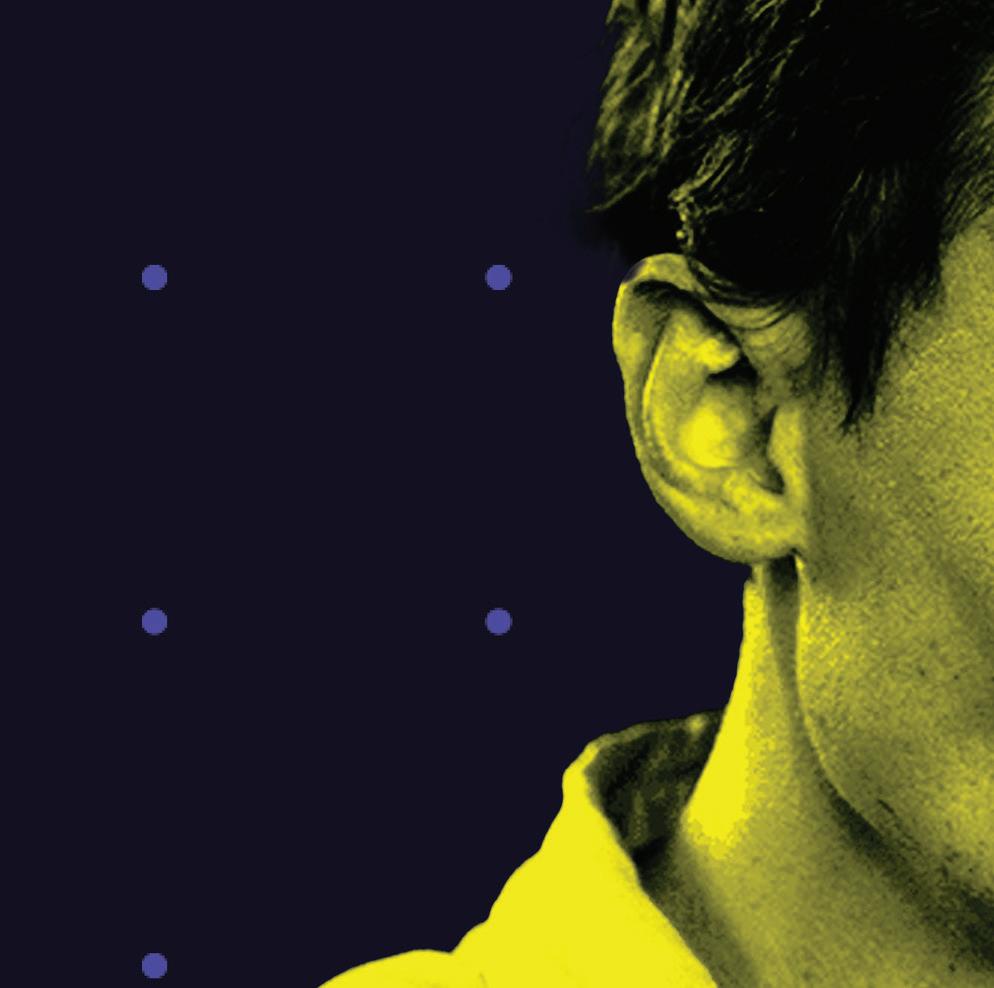The
THE
WILDCAT
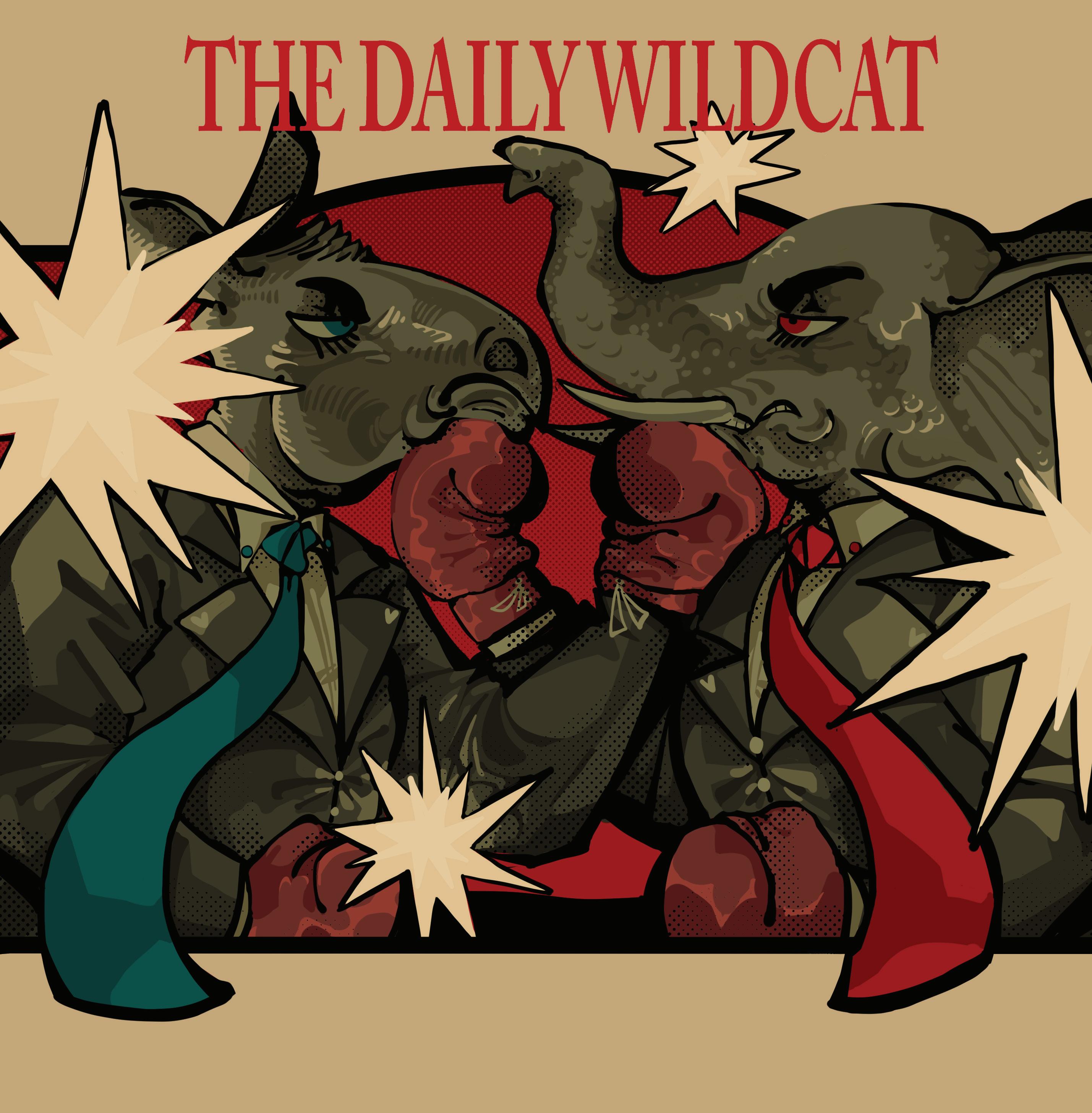
ELECTION EDITION
midterms are here and some major changes are on the
with this guide. This is everyone’s
Keep yourself
Use your voice and cast your
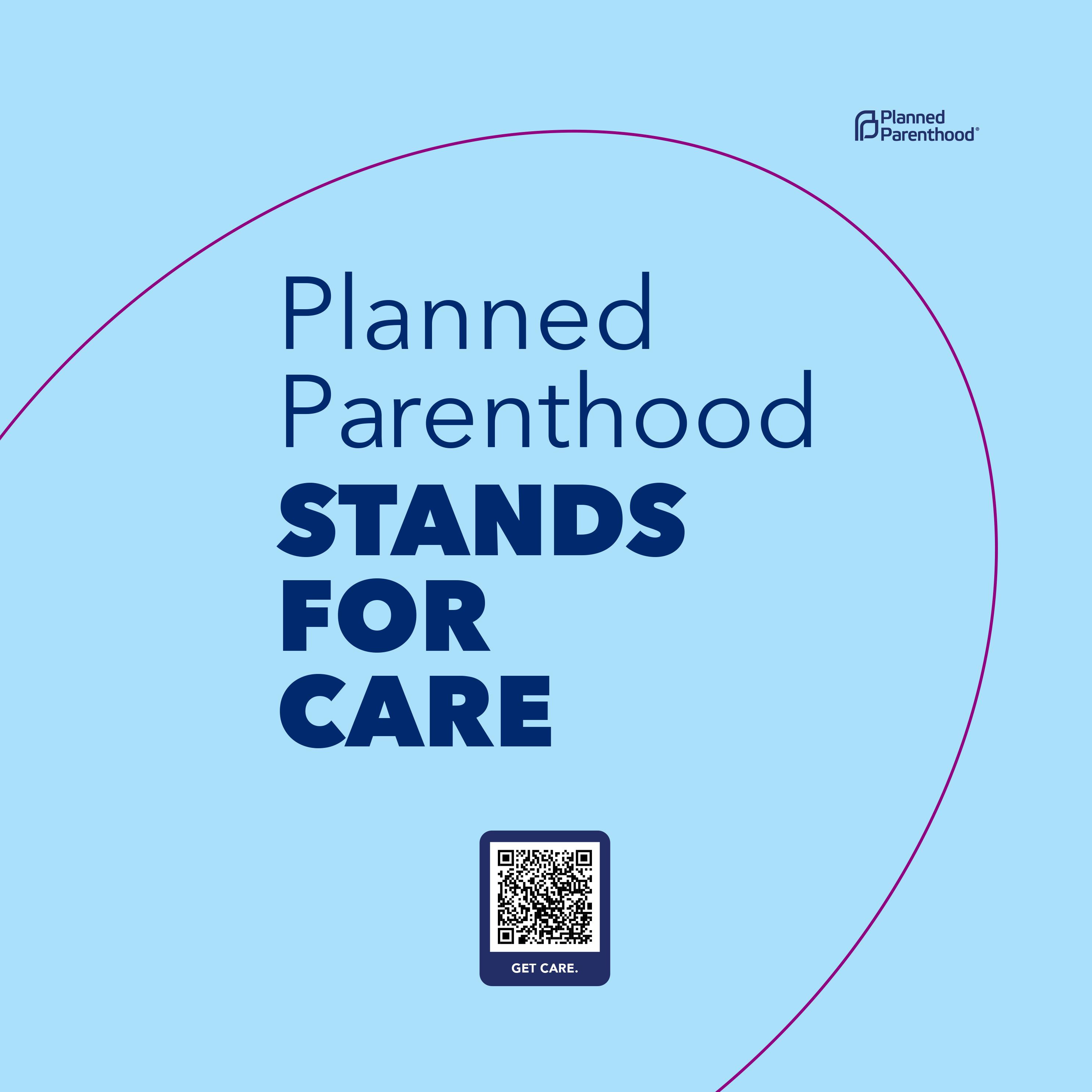
Governor race
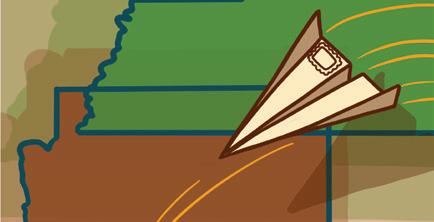

OPINION: Vote Katie Hobbs for governor

Campus clubs
Political groups on campus urge students to vote






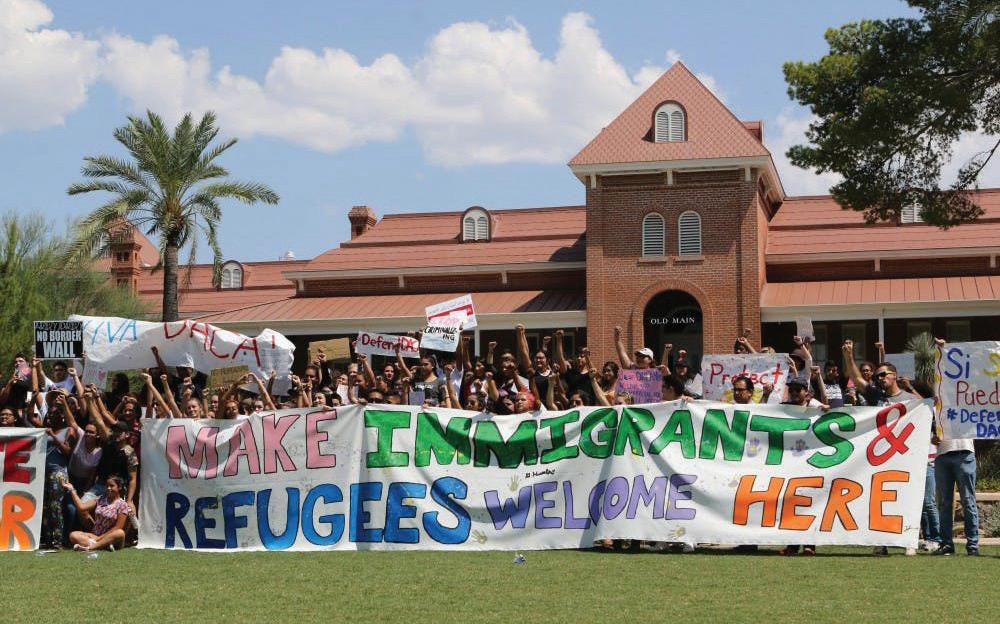
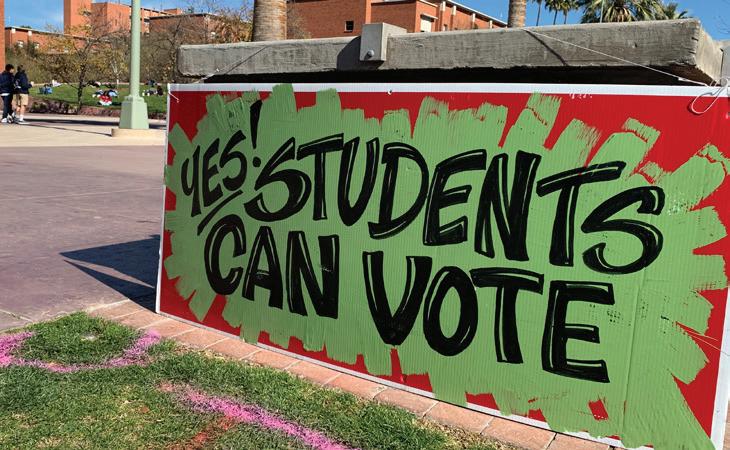
in your






News Reporters
Sports Reporters
Opinion Writers
Comics

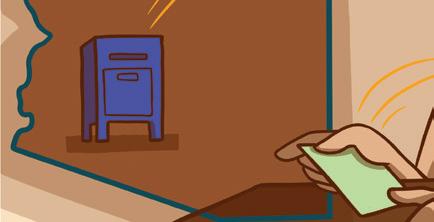


A collection of comics, courtesy of our Comics Desk
Arts & Life Reporters
Cartoonists


Galadriel Gross Nettie Gastelum Jasmine Ma Mary Ann Vagnerova Valentine Modestine Farrah Rodriguez Emilie Marie Cuevas






Photographers and Multimedia Reporters
Carly Marckovich Caitlin Claypool Jackie Cabrera Marrison Bilagody Ben Tisdale Gracie Kayko Antonia Muskat Noor Haghighi Annika Rogozin Kohichiro Yamada Amelia McAnear Liv leonard
Designers
JT Thorpe Hannah Martuscello John Konrad
Copy Editors
Ash Johnston May Otzen Hannah Palmisano Mason Duhon Emilee Ceuninck
UATV 3 General Manager
Britton gm@UATV.arizona.edu
KAMP Student






Manager
Reimers gm@KAMP.arizona.edu

Valentine
Key political races to watch out for in Arizona’s 2022 midterm election
BY SAM PARKER @SamParker849Governor e governorship of Arizona and a U.S. Senate seat are up for grabs in the upcoming Nov. 8 midterm elections.
In the gubernatorial race, Democrat Katie Hobbs is facing o against Republican Kari Lake to ll the seat left by Gov. Doug Ducey. Libertarian Barry J. Hess and Independent-Green Party candidate William Pounds are also running for governor.
Hobbs currently works as the Arizona Secretary of State. Prior to this position, she served as an Arizona state senator from 2013-19 and a state representative from 2011-13.
Hobbs is running for governor on a platform of “protecting women’s reproductive freedom, investing in our public schools to give every child in Arizona a world class education, nally addressing our water crisis and securing our water supply, and lowering costs on everything
from housing to groceries to school supplies,” according to her campaign website.
Lake is a former news anchor for FOX 10 News in Phoenix. Some key elements of Lake’s platform are “secure borders, energy independence, safe streets, education not indoctrination, pushing back against the radical Biden agenda, and preserving the western heritage that makes Arizona special,” according to her campaign website.
Former President Donald Trump endorsed Lake last September. Ducey, whose seat will be lled in the midterms, endorsed Karrin Taylor Robson in the Republican primaries, but Robson lost to Lake.
Whoever wins the governor’s race will be responsible for implementing state laws and acting as the overseer of Arizona’s executive branch. e past two governors of Arizona, Ducey and Jan Brewer, are Republicans.
University of Arizona’s political student clubs weighed in on this
race. Both clubs stressed the importance of utilizing your vote to make change.
According to an email statement from the UA Young Democrats, “Voting in every election is important, but who we choose to lead the state of Arizona is critical this year.
Katie Hobbs, the Democratic candidate for Arizona governor, is the only candidate who does not promote conspiracy theories and wants to work with all Arizonans to protect our right to vote. Katie Hobbs also wants to see Arizona state universities be as free as possible, as it says in the Arizona constitution.”
e UA Young Republicans also emphasized the importance of voting in an email statement the group sent to the Daily Wildcat, writing, “ e University of Arizona College Republicans United wholeheartedly urge students to go and vote. Voting is a way for us to get our voices heard, to make our beliefs known, and for our will to be carried out.
As college students, it is often so easy to get caught up in the whirlwind of assignments and tests, and forget to vote;
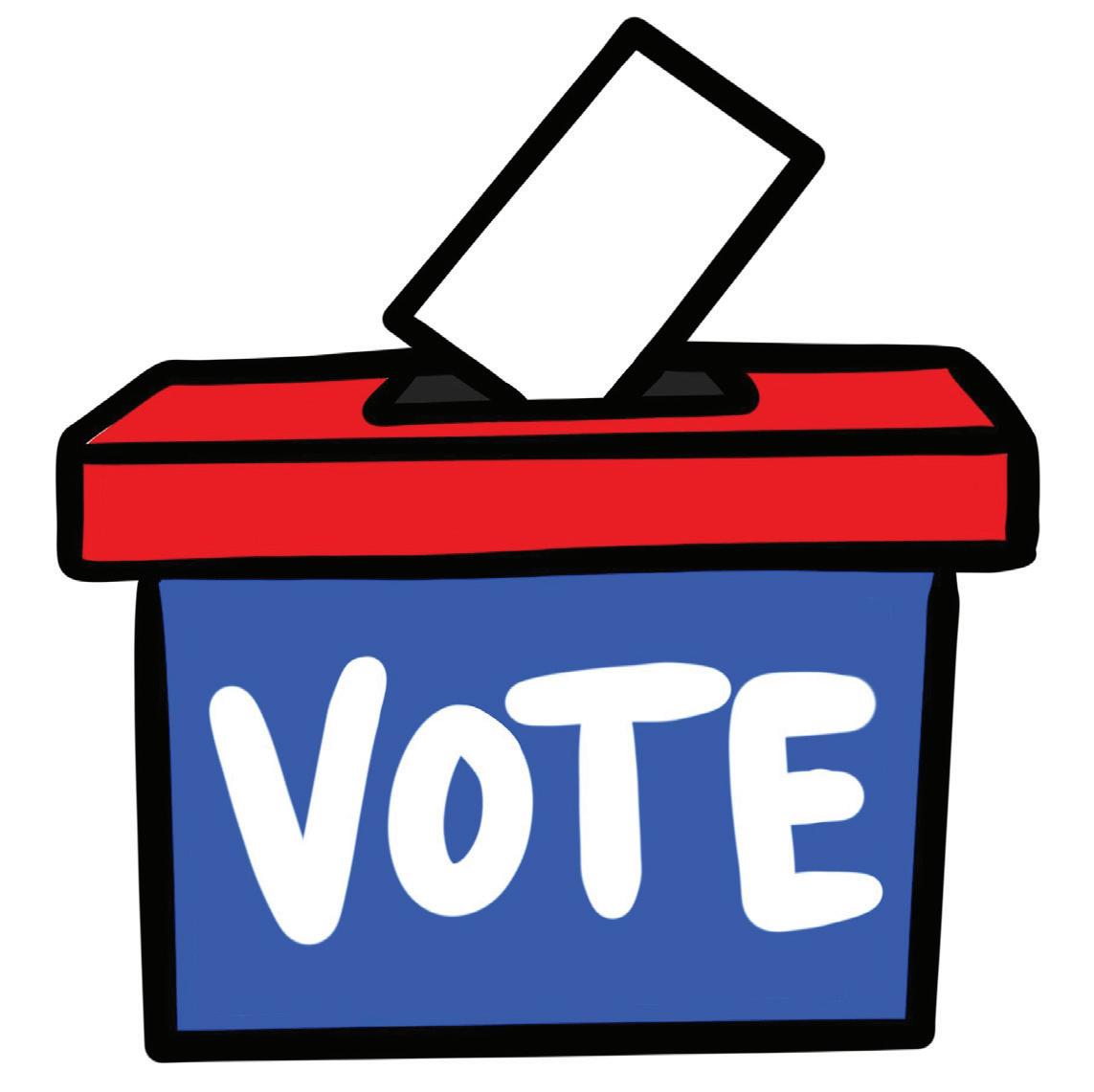
however, change begins with us. If you can’t go place your vote at the polls, how can you hope to change the world?”
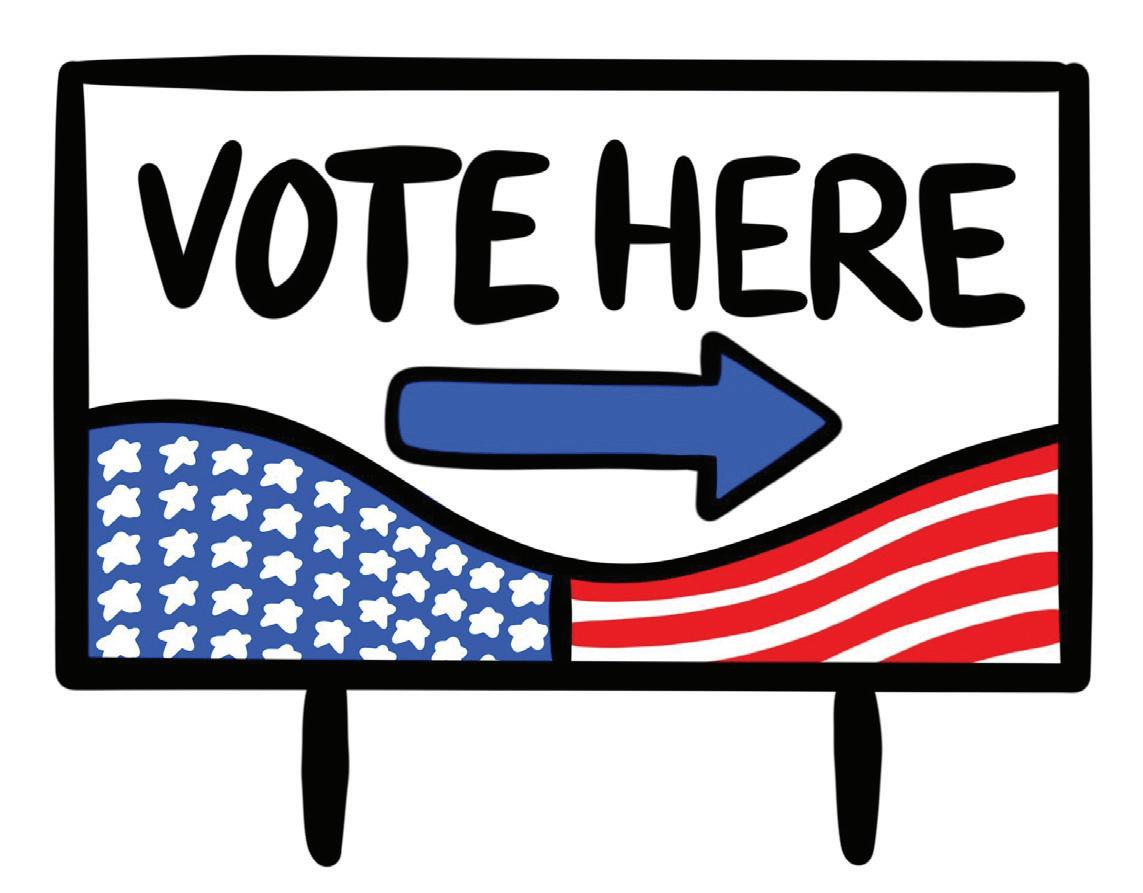
Senator
A U.S. Senate seat is also at stake in the Nov. 8 midterms.
While the governor race is between two candidates who haven’t held the seat, former astronaut and incumbent Sen. Mark Kelly, D-Ariz., is running for reelection to keep his seat.
Venture capitalist Blake Masters is the Republican nominee running for the seat after beating Arizona Attorney General Mark Brnovich in the primary race.
Kelly, who won the 2020 special election to fill former Sen. John McCain’s Senate
seat, emphasizes in his campaign promises of a commitment to bipartisan cooperation.

Kelly’s campaign website lists his priorities as “lowering costs for Arizona families, building a 21st century economy in Arizona, securing Arizona’s water future, cleaning up Washington and securing Arizona’s border and xing our broken immigration system.”
According to his campaign website, Masters is running “because the same old establishment politicians and the same old establishment
candidates have failed us. [Masters] brings a wealth of experience to the table on how to defeat not just the progressive Democrats, but also the weak and compromised RINO Republicans.”
Trump endorsed Masters in the Aug. 2 Republican primary.
According to a survey conducted by Pew Research Center, the issues at the heart of these midterm elections are (in order): the economy, gun policy, violent crime, health care, voting policies, education, Supreme Court appointments and abortion.
How the UA’s Democrat and Republican clubs approach midterm elections
BY KIARA ADAMS @kiadams101e midterm elections are rapidly approaching. For the University of Arizona’s student political groups this means there is no time like the present to engage their members and other students across campus.
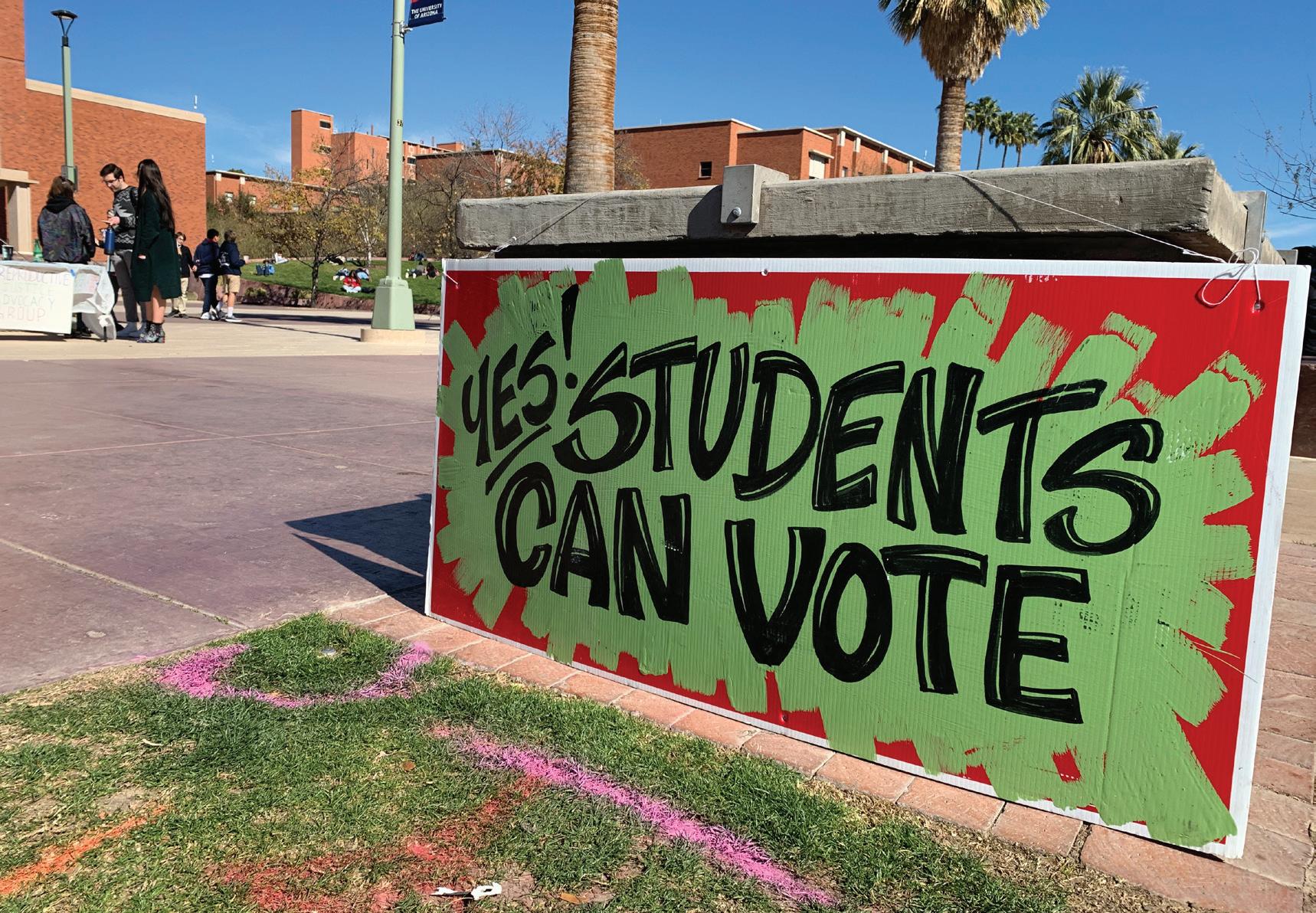
e UA College Republicans and the UA Young Democrats are two politically active clubs on campus that each represent the two major political parties in the country. While they don’t share the same viewpoints, they are each preparing for the midterm elections in their own ways.
“We’re actually partnering with multiple campaigns across the state like senatorial, gubernatorial and just the general GOP. But essentially, we go out and do a bunch of canvassing. So we’ll do door-to-door knocking as well as calling and texting voters,” College Republicans President Alton Zhang said.
While the College Republicans are canvassing to get their club involved, the Young Democrats are also nding their own ways to prepare.
Anastasia Taylor, the Young Democrats president, said that the group is working on educating the community and members on the candidates running for o ce. e group even got to speak with Kirsten Engel, a congressional candidate from district six, about her platform.
“I really think that we as an E-Board have really pushed for getting to know candidates. You see these ads on TV and social media posts, but that’s really not the best way to meet a candidate, so we’ve just been meeting them and asking them questions to get a true sense of their platform,” Taylor said.
Both clubs are making strides to inform their members about the upcoming midterm elections,
and these clubs also feel strongly about the importance of the midterms as a whole and what they represent for the nation.
“ e midterms are important because they are the pulse of the nation. Presidential elections are amazing, and they’re very important, but I think that Americans, and university students particularly, often neglect that the midterms are just as, if not more, important,” Zhang said. “If you don’t like what the president is doing, then you’re supposed to use your vote to cast your voice out into Congress. If you do like what the President is doing, then they might need help in the Senate or in the House of Representatives. ey might need that vote that they don’t have in Congress.”
e midterm elections play a big part in what a president is able to get done in their term. If a midterm election ips which party has control of any chamber of Congress, it could potentially alter plans or policies that the president could have been working to implement.
On top of this, the terms are di erent for each position as well, which Taylor explains.
“Historically, [midterms] are important because Congress and the House of Representatives are voted in every two years, and Senators are voted in every six years. So the midterms are a really good way to gauge where the country is ideologically regarding politics,” Taylor said.
Where the country is at currently is playing a large role in how Taylor and the Young
Democrats are viewing the midterms as well. With the overturning of Roe v. Wade and Arizona recently passing a law banning abortion at 15 weeks across the state with little to no exceptions, the Young Democrats are urging people to vote.
“ e rights of minorities in this country are being trampled, and I think that’s the bottom line of why the midterms are important. We need people in power who are going to ght for the rights of everyone, not just white men,” Taylor said.
With Arizona politics making national headlines recently, state elections are now particularly more important than ever.
“ e presidential race in Arizona was a very tight race with a di erence of only 11,000 voters. ere are several times

that amount of students at universities like here or [Arizona State University], for example,” Zhang said. “I hear so often college students saying things like, ‘oh, my vote doesn’t matter,’ or ‘it wouldn’t make that much of a dent,’ and I laugh at that because our local elections are decided by even thinner margins than 11,000.”
e College Republicans heavily stress the importance of being politically engaged, especially as college students.
“We are not meant to be silenced. We have a voice, and if you do not engage with the politics in your country, then you’ll just have to sit by and watch while people in power make decisions for you. Decisions that you may or may not like. If you want to protect your country, if you want to protect your ideals, you actually have to get out and do something about it,” Zhang said.
Young Democrats express the same beliefs on the matter of college students being politically engaged.
“It’s important for everyone, but for college students especially, I don’t think we put a lot of thought into it because we feel as though these things don’t a ect us. … I think as young people, we have this thing [where we think] that everything is ne and that we’re super people and that I can only care about so much while trying to survive o my minimum wage job. Which as messed up as it is, these issues we are ghting for now are either going to a ect you down the line or even right now,” Taylor said.
e Arizona midterm elections will take place Nov. 8. Both clubs are preparing for what could be considered a turning point for the state of Arizona, with candidates vying for positions such as U.S. senator, governor, attorney general and secretary of state.
e futures of Arizona DACA college students are on the ballot this November
BY PAYTON TOOMEY @PaytonToomeyArizona voters will decide on Nov. 8 if Deferred Action for Childhood Arrivals students will receive in-state tuition at the state’s three universities and community colleges.
If approved, Prop 308 would allow all students, regardless of citizenship status, to receive in-state tuition at Arizona universities if they have attended an Arizona high school for two years and graduated from an Arizona high school.
e law now requires students who fall under DACA to pay 150% of in-state tuition after attending an Arizona high school for three years and graduating.
If they do not fall into this category, they pay out-of-state tuition, according to Jessica Martinez, coordinator of immigrant student support systems at the University of Arizona rive Center.
DACA o ers protection for those who were brought into the United States as children without documentation. e program was established in 2012 under former President Barack Obama’s administration and has been a contentious issue in elections since.
Around 2,000 undocumented students graduate from Arizona high schools each year, according to the Higher Ed Immigration Portal.
“So this is also about fairness, and it will help hopefully open the door to about 2,000 more Arizona students to better a ord college education, so we’re all to support that,” said Erin Hart, senior vice president of Education Forward Arizona.
Education Forward Arizona is an advocacy group that promotes prioritizing education in Arizona politics.
Hart said Prop 308 has largely
OPINION: Vote ‘yes’ on Prop 308
BY SOPHIA HAMMER @SophiaHammer8e perspectives surrounding immigrants have only become more hateful in the last few years, especially after the presidency of Donald J. Trump. One of the main foundations of Trump’s campaign was built upon antiimmigrant rhetoric claiming that “when Mexico sends its people, they’re not sending their best.” He continued with destructive statements like, “ ey’re bringing drugs. ey’re bringing crime. ey’re rapists.” During this upcoming midterm election cycle, we have the power to help change the narrative of hate that has been hurting immigrants throughout Arizona for so long. We can do so by voting yes on Proposition 308. is will help uplift our migrant communities, while also providing support to youth — the
future of Arizona.
Voting yes would give DACA recipients — commonly known as “Dreamers” — the ability to access in-state tuition at every Arizona public university and community college regardless of their immigration status. Prop 308 would apply to students in Arizona who have graduated from high school and who have gone to an Arizona school for at least two years. Everyone deserves to have access to a ordable education and it shouldn’t di er based solely on current immigration standing.
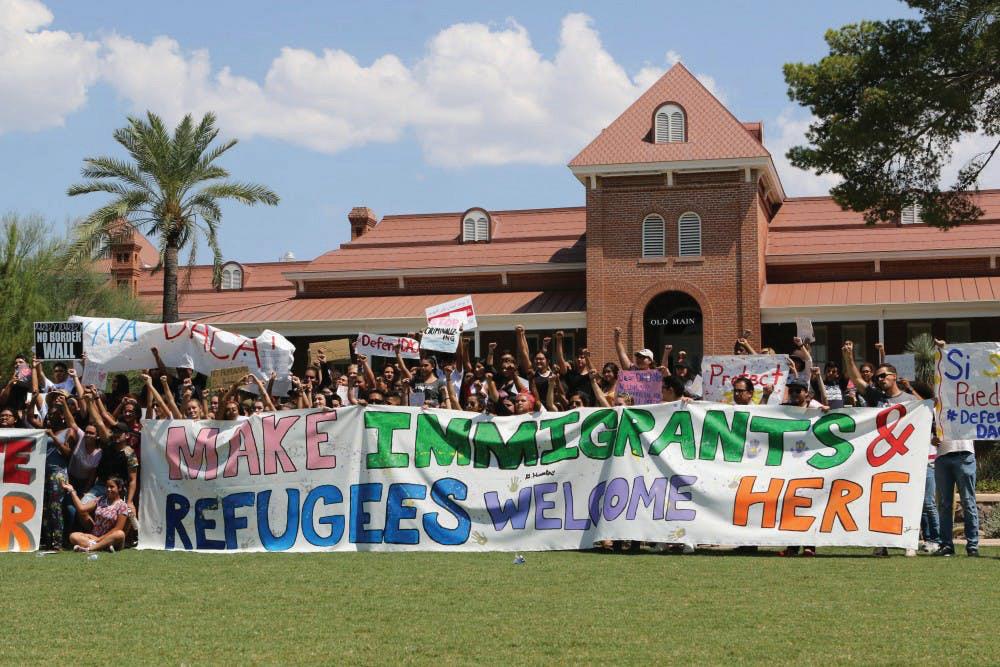
“High school graduates who call Arizona their home deserve in-state college tuition. Dreamers, who were brought to the U.S. by their parents, should have the same educational and employment opportunities as any other Arizona student,” Tucson Mayor Regina Romero expressed in the 2022 Election Publicity Pamphlet.
bipartisan support from Democrats and Republicans.
According to Yeson308.org, the initiative is endorsed by former Republican state Sen. Bob Worsley, former Republican Arizona State Sen. Heather Carter and Tucson Mayor Regina Romero, as well as many other prominent Arizona politicians and organizations.
“It can be a great example of how this bipartisan support could do something


to help students,” Hart said.
While Proposition 308 would ease the nancial tuition burden, it does not impact federal nancial aid. DACA students cannot receive any type of federal nancial aid, but there are private scholarships that the UA rive Center promotes to DACA students.
Information on the private scholarships that do not require proof of citizenship can be found at immigrant. arizona.edu/ nancial-aid-scholarships.
For Arizona residents, the average estimated cost of tuition at the University of Arizona is $13,200, whereas it’s a staggering $39,000 for non-Arizona residents. Many “Dreamers” have been raised in Arizona and have contributed so much to our community in terms of skills, experiences, diversity, culture and more. e current price Dreamers have to pay is therefore absurd considering the ways in which Arizona has been positively in uenced by these students.
“Currently, 2,000 undocumented students graduate from Arizona high schools every year,” Carolina Silva, the executive director of Scholarships A-Z, stated in the 2022 Election Publicity Pamphlet. However, most undocumented or “Dreamer” students often are, “lacking the institutional support,
guidance, and supportive network they deserve,” she continued.
Silva is right, “Dreamers” are deserving of a network surrounded by supportive individuals. We are supposed to be an inclusive community for all immigrants in Arizona and throughout the United States. If we want to live up to the values of inclusivity in our college community, we need to vote “yes” on Prop 308.
Tuesday, Oct. 11, was the last day to register to vote in this election. If you are registered, make sure to vote in this upcoming midterm election on Nov. 8 and watch for Prop 308 so you can say yes!
— Sophia Hammer is studying in family studies & human development and global studies. She loves to write about politics.
OPINION: Vote blue for the 2022 Arizona governor race
BY SOPHIE APPLIN, NOOR HAGHIGHI AND LUKE LAWSON @DailyWildcatWith the days narrowing before the Nov. 8 general election, many Arizona residents will soon decide who to vote in as the next leader of their state as governor: Democrat Katie Hobbs or Republican Kari Lake.
The Daily Wildcat Opinions Desk offers up a few reasons why Hobbs is the clear choice over her conservative counterpart.
Over everything else, we encourage you to get to the polls and vote. Your voice counts and it’s important to make it heard.
Katie Hobbs (D)
Secretary Katie Hobbs is an Arizona native who has spent her career helping Arizonans. After graduating college from Northern Arizona University and attending graduate school at Arizona State University, she began work as a social worker, where she immediately started helping homeless youth in Phoenix. She has also served in the Arizona Legislature and is currently the Secretary of State for Arizona. Many of her plans and accomplishments center around bringing accountability to political offices and creating solutions for the real and everyday problems Arizonans face.
It is clear Hobbs has a lot to offer Arizonans. Having worked with Arizona families so much in her life, she knows what the average person needs in their everyday routines. As the nominee for the Democratic Party, she has plenty of ideas for how to shape Arizona from the office of the governor.
Most of the strength of her platform revolves around combating real social issues that have become problems over the last few years.
One of the problems she plans to address is abortion access and care. Coming from a social work background, she understands the consequences an unplanned pregnancy can have on women and their families. Since Roe v. Wade was overturned, Hobbs said she plans to secure the freedom of choice in Arizona, tackling Republican-made laws within the state that attempt to limit this form of health care. She also plans to expand access to family planning resources and other reproductive care within the state.
Hobbs also is active in addressing equity and justice and is aiming for an inclusive

government that works for all, something else that has become relevant within the past few years. Hobbs plans to recruit and hire women and people from underrepresented communities to ensure all Arizonans are heard under her administration.
At the state level, she plans to create the roles of chief equity officer and civil rights policy advisor. These positions will hold Arizona accountable in promoting diversity within the workforce.
To address the wage gap, Hobbs would like to publicly audit statewide employee salaries to reveal the pay inequalities that exist. She also would like to invest in minority-owned businesses, expand access to capital for these businesses and expand diversity within the STEM field.
Further issues to be addressed include access to the ballot for communities of color, addressing racial disparities in the criminal justice system and strengthening equal rights by banning LGBTQ+ discrimination in multiple areas.
These are only a few of the issues Hobbs would address as governor of Arizona, all of which are of vast importance. Not only does she have plans for these issues, but she has firsthand experience in government and social work and knows what it takes to deliver for Arizonans.
Her campaign website is also easy to navigate and is very detailed regarding what her plans are for the state – transparency and accessibility that is encouraging to a potential voter.
While these ideas may be appealing to certain audiences, others may not be impressed with them. Being informed on multiple issues about different candidates is essential when it comes to voting.
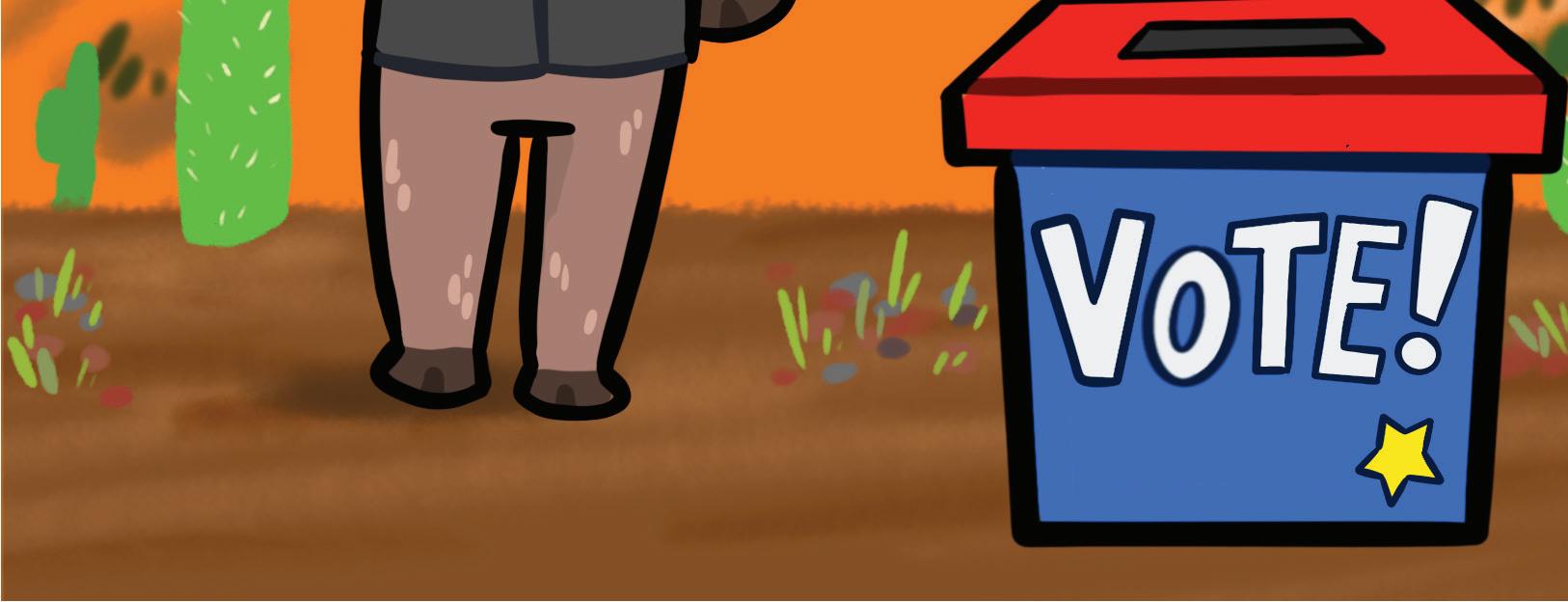
Debates are an easy way to compare candidates and see them express how their ideas and plans will work, while also being challenged by the other side. However, Hobbs has refused multiple times to debate Republican candidate Lake.
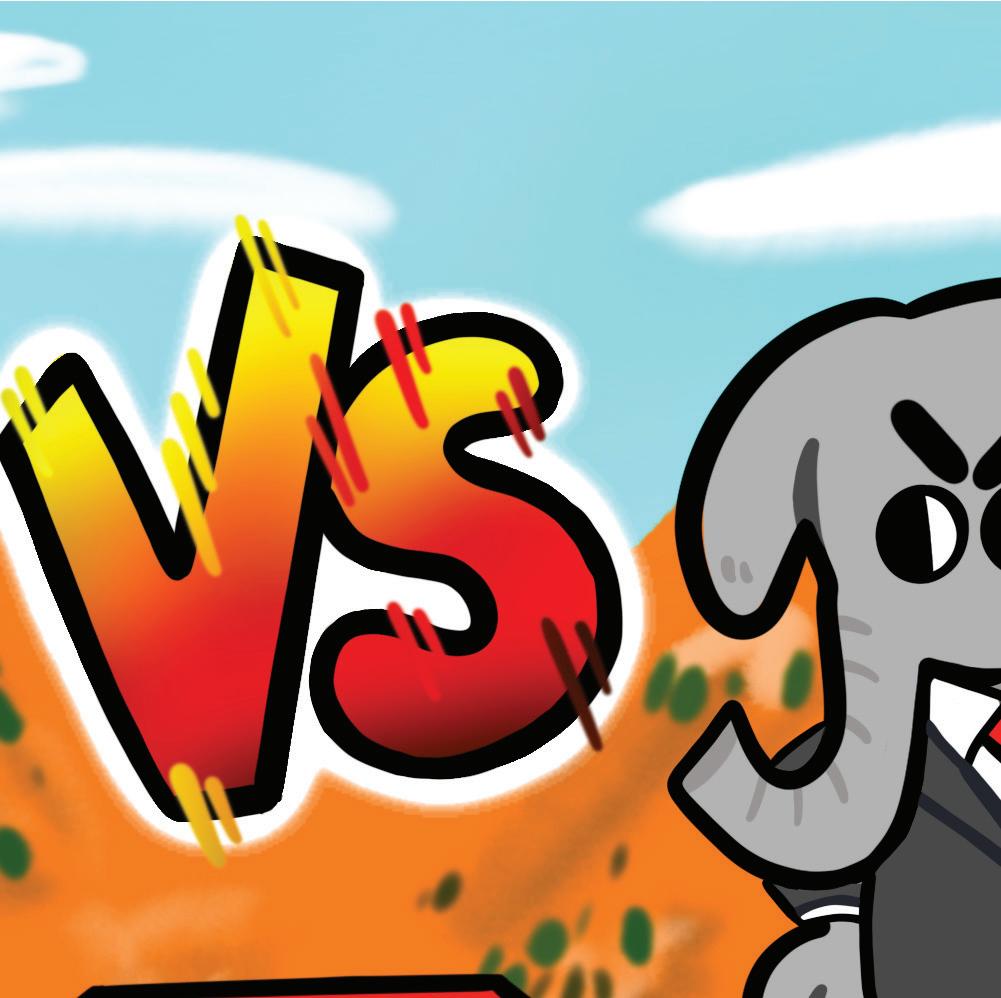
Hobbs said she believes that a debate with Lake would only give the Republican candidate a chance to create a performance like that of the Republican primary debate.
Hobbs also added that one “can’t debate a conspiracy theorist,” and that Lake would mention past elections during the debate.
While Hobbs has valid reasons for declining a debate with Lake, it does limit the scope of her campaign. Swing voters may
be less apt to vote for someone who refuses to take part in any bipartisan discourse at this level.
Kari Lake (R)

A former broadcast journalist and news anchor for Phoenix television station KSAZ-TV, Kari Lake is running for Arizona governor as part of the Republican Party. She graduated
from the University of Iowa with a degree in communications and journalism.
Lake states on her official campaign website that she is pro-life, anti-vaccine and in support of securing the Mexico–United States border with a wall. Lake takes a strong stance on some of the most topical issues voters will be met with at the polls and follows former Arizona Gov. Doug Ducey in
many of her beliefs and policies. Perhaps one of the most controversial candidates gracing the Arizona ballot this November, Lake has drawn attention to herself across the state for her aggressive policy ideas and public persona. Lake is vocal about her belief that the 2020 election was stolen from former President Donald Trump, and it is one of the founding
components of her campaign. This position is not a new one for farright Republican candidates across the U.S. Yet, in a state that will hold immense sway in the 2024 presidential election, Lake’s 2020 election denial could help shoot farright Republican policy to the forefront of American politics should she secure the job as Arizona’s governor.
e Republican gubernatorial candidate also has expressed strong opinions regarding water usage and abortion in Arizona, two issues that voters will have in mind at the polls.
Lake says on her website that water availability in Arizona and the Southwest as a whole is – and will continue to be – an enormous problem residents face.
However, there is an element of this discussion that Lake does not address, and that is climate change. Lake advocates for desalination and pumping water from outside the state, as well as expanding existing dams and reservoirs to better utilize storm runo
Noticeably absent from her water policy is a discussion on climate change, an issue that is especially important in a state already struggling with extreme heat and drought.
Arizonans should also note Lake’s views on abortion, one of the most important issues guiding voters at the polls this year. On her campaign website, Lake states that she is pro-life. While Lake has not come down quite as hard on the issue as some other Trump-endorsed Republican candidates, she stated in an October interview with “Face e Nation” that she wants “to give women true choices. I will uphold the law, whatever that law is.”
Current Arizona law surrounding abortion is confusing for many, especially after an appeals court ruled on Friday, Oct. 7, to halt the enforcement of a pre-statehood law that would criminalize abortions regardless of circumstance.
Regardless of pre-statehood laws, Lake is still in the anti-abortion camp and will continue to be should she take o ce as Arizona’s governor. With so many voters viewing abortion rights as an important issue, Lake’s pro-life stance is vital to know.
Lake’s increasingly radical viewpoints on Arizona issues mirror many far-right, Trumpendorsed Republicans on ballots across the U.S. Where Lake diverges from her predecessors is in the area of creating new and exciting issues for Arizonans to consider, the titular issue being what she calls, “Cancel Culture & Censorship.”
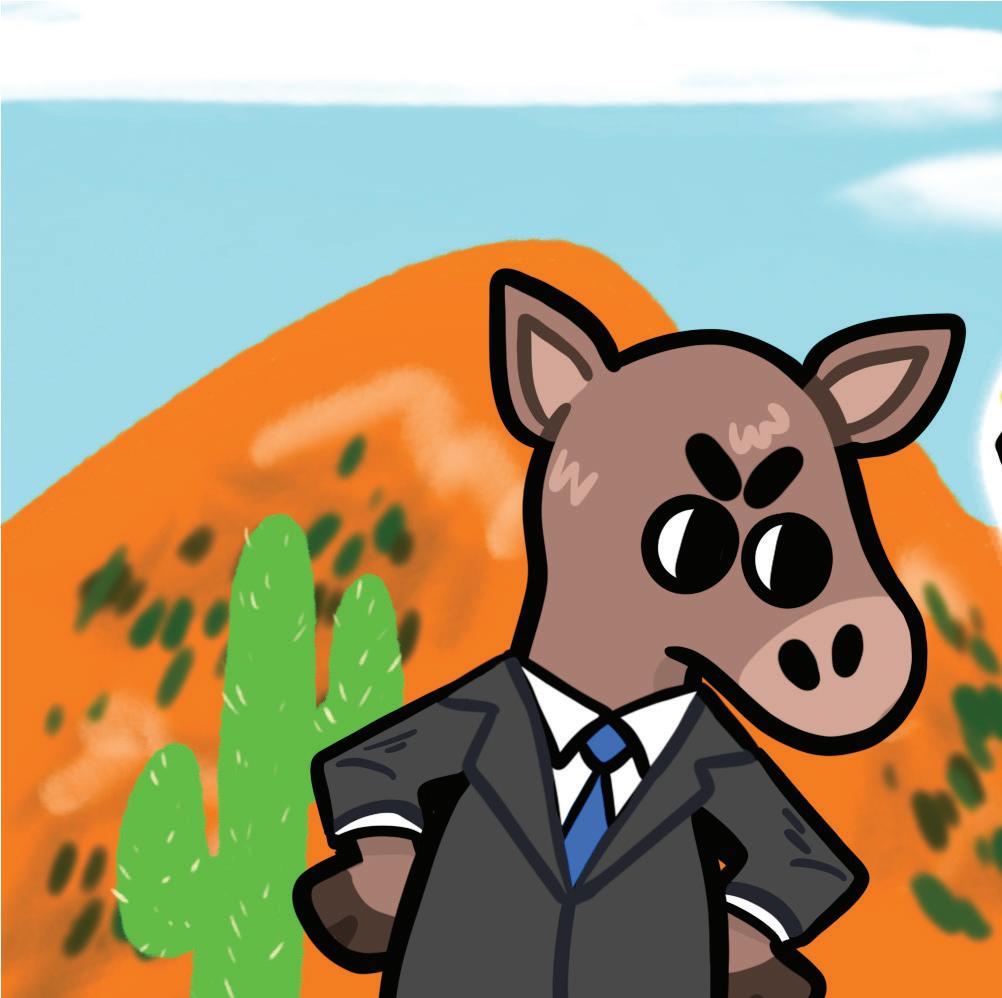
It seems as though 22 years in front of the camera has made Lake a bit wary of cancel culture pushed by those who are, as she says, “mentally unbalanced.” She said she plans to cut shared state revenue, grants and more from schools that intentionally supress free speech that is not within the realm of inciting violence – a de nition that is vague at best.
is goes for businesses too, where Lake claims she will pull eligibility for tax breaks
for businesses that “engage in cancel culture.” is insistence on protecting free speech does not seem to extend to people who claim the 2020 election was not, in fact, stolen.
Lake is a candidate who is more preoccupied with her own image and rise to power than she is with Arizona residents’ well-being. To elect Lake would mean skyrocketing a woman to one of the most in uential positions in Arizona government who has no concrete political experience and instead relies on a disgraced former president’s endorsement, punchy language and ashy TV appearances.
It’s time for change
Time and time again, we have been told that it is our responsibility to vote in the candidates that will better our future. And, as much as this request has been exhausted, it is true.
There is no reason to be indifferent about social and political reform when it affects us on a daily basis, both short-term and long-term. Some say politics has no effect on them, but no matter how dirty it can all get, the choices that powerful people make determine our freedoms and, more importantly, the freedoms of the people we may not even know who are much less fortunate than ourselves.
When it comes to the office of the governor for Arizona, there are many ideas to consider. One’s background, social ideas and future plans can determine how far a candidate may go in an election. Exercising the fundamental right to vote in this election can be a first step for anyone looking for a way to make a change in Arizona.

We shouldn’t have to keep protesting for our basic human rights, and if we put the right people in office, there eventually will be no need for movements like Red for Ed or March for Our Lives, because the state will be a safer place for everyone and not just for the politicians dictating our futures.
With Ducey leaving office after eight consecutive years, now is our chance to elect an official that is truly inclusive and demonstrates empathy without having to make accusatory claims.
With this assessment in mind, make the logical choice. There is evidently one candidate who puts the Arizonan people first and stays true to her values in reform proposals and in action. Don’t drown in the Republican fantasy world of Lake; instead, vote blue on Nov. 8.


































































Every election season, determined canvassers are ready to ask about your voting status
BY ERIKA HOWLETT @erikaehowlettAny student strolling around the University of Arizona’s campus has likely been stopped by someone, maybe a young student or maybe an older adult, with a clipboard and perhaps a lanyard. Sometimes they want you to sign a petition, but as the November midterm elections approach, it’s all about voter registration.
at’s why so many students are frequently greeted with the age-old question: Are you registered to vote in Arizona?
While some students may not appreciate an interruption in their hustle to class, the people stopping them are okay with rejection because it’s a cause they really care about.
College student voter turnout has been on the rise in recent years. Nationwide, numbers were higher than ever in the 2020 presidential election.
According to the National Study of Learning, Voting, and Engagement’s 2014 and 2018 Campus Report for the UA, voter turnout in the 2018 midterm elections was 35.6%. is was a signi cant increase from
2014, but it also means that nearly two-thirds of eligible students did not vote.
e people registering voters come from a variety of organizations. One of the most active is Mission for Arizona, a statewide campaign by the Arizona Democratic Party that is working to re-elect Sen. Mark Kelly. ey have groups run by students working throughout the state.
Lately, the University of Arizona chapter has set up shop under a tent on the UA Mall, encouraging passersby to register to vote, especially during the week of Sept. 20, National Voter Registration Day.
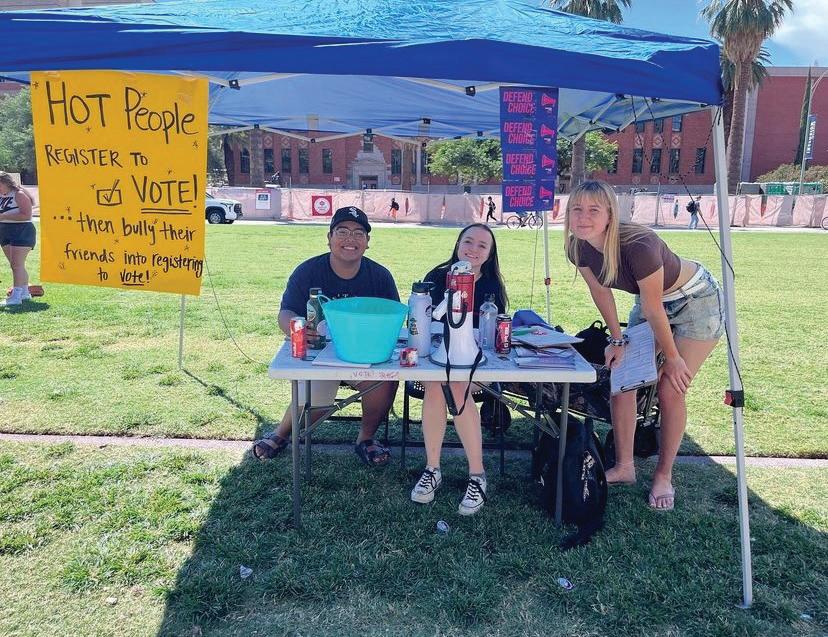
Some of their volunteers are UA alumni, like Mariette Francis. She and fellow volunteer Yvonne Foucher were outside the Student Union Memorial Center recruiting a couple of voters.
ey explained that out-of-state students are able to register to vote in Arizona.
“Here in Arizona, we are a swing state, so we need as many people as possible to vote here,” Foucher said.

Foucher is a self-described “concerned citizen” who has only recently begun registering young people to vote but says it’s her passion.
“We only have two-thirds of all Americans that vote in our elections, and that’s despicable,” she said.
Foucher estimated that about half the student body is knowledgeable about voting issues but that many simply don’t care and even lie about being registered.
“Unfortunately, it isn’t maybe until later they realize how important voting is because they’re so focused right now on school,” Francis said.
Carter Everly is also a volunteer for Mission for Arizona and a sophomore studying sociology and geography. He has just started volunteering for them this semester.
“It’s honestly really fun,” he said. “I love doing it; it makes me feel better. I think that people don’t like me as much when I do it, but I really enjoy doing it.”
Everly added that it can be di cult to get people to listen to them but wants to ensure that young people’s voices are heard.
“Some people don’t w ant to be bothered while they’re walking, for sure, but I think it’s worth it to get people actually registered,” he said.
ough Mission for Arizona is run by the Democratic party, the volunteers stressed that voter registration is non-partisan.
Another on-campus club involved in the movement is Arizona Asian American Native Hawaiian Paci c Islander Students for Equity. ey’ve been on the Mall nding students to register, as well.
Junior neuroscience and cognitive science major Avneet Kaur is one of the students helping out.
“Our club SFE, Students for Equity, is nonpartisan, so everyone is welcome to register to vote regardless of your party a liation,” Kaur explained. “It’s community outreach; we want people to register to vote, especially because the elections are coming up. I think everyone’s voice matters, and it’s very crucial that everyone votes.”
Both SFE and Mission for Arizona speci cally mentioned women’s reproductive rights as a reason people should be voting.
“ e topics that are currently being voted on impact a huge part of the population, especially women with abortion rights and contraception rights,” Kaur said. “We’re just trying to get people to be more active.”
She said they also got a lot of voters registered earlier in the semester, but
things have slowed.
“We’ve noticed a lot of college students, they’re very hesitant to register to vote,” she said. “ ere’s a lot of people who … [are] not open to registering at all, and that’s been a challenge. Some people will say snarky comments, which is a little discouraging, but there are people who will listen to you.”
Kaur said she believes that college students need to use their voice, especially since they will be most a ected by the future policy.
“College students, I don’t know if this sounds kind of cliché, but we’re the next generation that’s gonna be running things,” she said. “So it’s important for us to be more active in our political system and get what we want out of the government.”
ere have also been canvassers from FieldWorks, a nationwide organization that assists Democratic campaigns. ey can be spotted in green lanyards recruiting potential voters outside the UA Main Library.
e deadline to register to vote in Arizona is Oct. 11. Of course, registration is only half the battle.
In 2018, over 10,000 UA students who were registered to vote didn’t actually cast their ballot.
is time around, early voting begins on Oct. 12, and election day is Nov. 8. Students can con rm their registration, nd their polling place and more at my.arizona.vote.

Make informed decisions this midterm: A quick guide to Arizona’s 2022 ballot propositions
BY DAILY WILDCAT STAFF @DailyWildcatProp 128 – Legislative Changes to Ballot Initiatives with Invalid Provisions Amendment
Proposition 128 would give more authority to the Arizona legislative body/United States Supreme Court to make corrections, override or divert funding from an initiative or vote made by the people of Arizona on the basis of there being illegal or unconstitutional language found within the initiative.
If Prop 128 does not pass the laws currently in place for measures passed by the people to be amended, funding diverted or be overridden would remain the same.
Prop 129 – Single-Subject Requirement for Ballot Initiatives Amendment
If Prop 129 is passed, a change to the Arizona constitution would be made that would affect what shows up on future ballots. Specifically, it would limit ballot measures to address one single subject and that subject would need to be mentioned in the measure’s title.
This would then end what’s known as “log-rolling,” where multiple measures are combined in one bill so people can only vote for or against all of them at once – even if the mixture of measures share little to no similarities.
Prop 129 could keep possibly unfavorable measures from being passed by them being mixed in with a group of highly favorable/agreeable measures simply because the new rule would require each measure to be voted on individually.
Prop 130 – Property Tax Exemptions Amendment
If passed, Prop 130 would group four sections of the Arizona constitution regarding property taxes into one section, remove determination of the amounts of certain property tax exemptions and allow property tax exemptions for veterans with disabilities and widows.
Prop 131 – Create Office of Lieutenant Governor Amendment
If voted on by Arizona residents, Proposition 131 would induct a Lieutenant Governor for the state of Arizona. This position would fulfill the role of governor in the event that the sitting governor is unable to fulfill their duties whether due to illness, disability, or death. The Lieutenant Governor will be selected by the gubernatorial candidate and will run beside them on a joint ticket.
Prop 132 – 60% Vote Requirement for Ballot Measures to Approve Taxes Amendment
Proposition 132 would require a 60% majority vote (three-fifths) to pass ballot initiatives and any amendments that would raise taxes.
Prop 209 – Interest Rate Limit on Debt from Healthcare Services and Collection Exempt Property and Earnings Increase Initiative
If passed, Prop 209 would change Arizona law when it comes to debt collection. Specifically, it would reduce the max interest rate on medical debt from 10% annually to no more than 3% annually. It would also keep certain assets from being included in debt collection, which could protect people from losing their houses, cars, certain possessions or more to debt collectors.
Prop 211 – Campaign Finance Sources Disclosure Initiative
This proposition aims to reform campaign finance disclosures. If passed, it would require campaigns to disclose the original sources of their donors if they spend above a certain amount on campaign media. The disclosure requirement applies to local campaigns that spend $25,000 or more or statewide campaigns that spend $50,000 or more.
Some proponents of Prop 211 argue that this reform will discourage the influence of “dark money” in Arizona elections, while opponents of Prop 211 say the disclosure is an attempt to stifle campaign contributions.
Prop 308 – In-State Tuition for Non-Citizen Residents Measure
If approved, Prop 308 would allow all students, regardless of citizenship status – including DACA students, to receive in-state tuition at Arizona universities
if they have attended an Arizona high school for two years and graduated from an Arizona high school.
To read more about Prop 308, go to page seven of this edition, where Daily Wildcat News Editor Payton Toomey breaks it down in detail.
Prop 309 – Voter Identification Requirements for Mail-In Ballots and In-Person Voting Measure

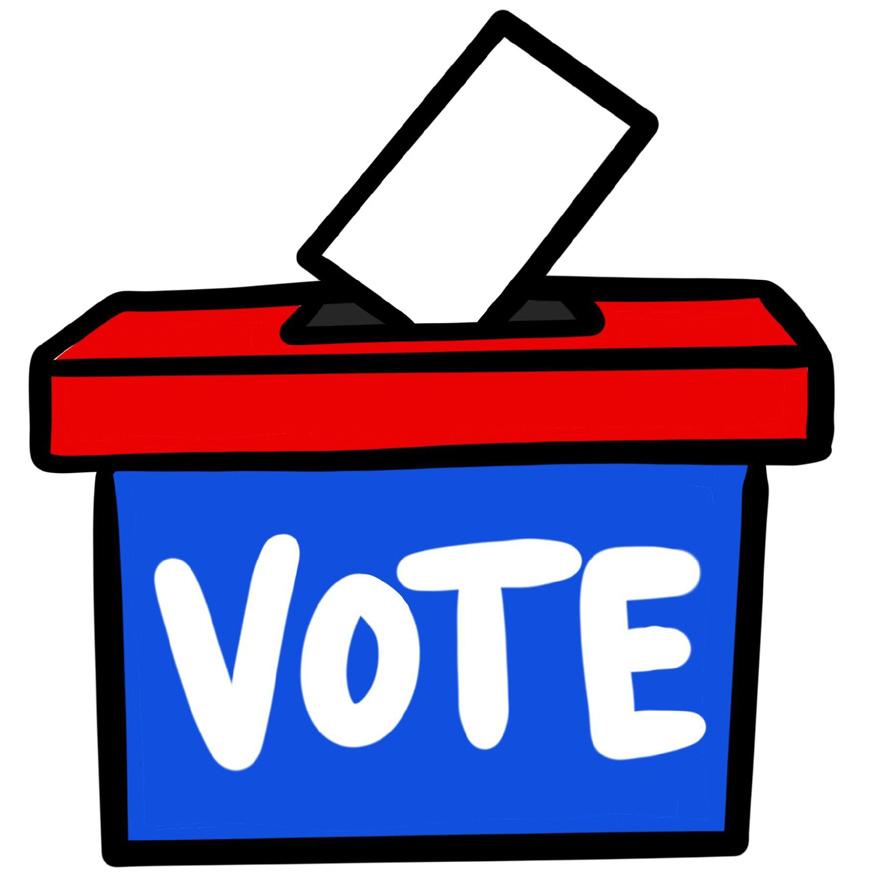
Proposition 309 could change what type of voter identification is required when submitting a ballot by mail-in or in person if passed. According to the outline of the proposition, voters would be required to provide a photo ID issued by Arizona State, the U.S. government or a tribal government when voting in person.
Currently photo identification is not required to receive a ballot in person if an individual provides two other forms of written identification such as a birth certificate or social security number.
Those who opt to vote via mail-in ballot would be required to provide their drivers license number, social security information, birth date and other personal information on the affidavit accompanying their ballot.
Some who are endorsing Prop 309 believe security measures for voting practices could be improved and think this would prevent voter fraud.
Some who are against the proposition have raised concerns about voter privacy and the barriers this would add to accessibility of voting.
If Prop 309 is not passed, the current law in place about what identification materials are required to obtain a ballot would remain unchanged.
Prop 310 – Sales Tax for Fire District Funding Measure
This proposition aims to raise revenue for fire districts throughout the state. Passing Proposition 310 would establish a 0.1% sales tax for 20 years beginning on January 1, 2023. The funds would be pooled into a Fire District Safety Fund and distributed in proportion to each district’s total property value.
Some proponents of Prop 310 say that the tax will help underfunded fire districts hire the personnel and purchase the equipment needed to improve operations, especially emergency response times. Some opponents of Prop 310 argue that the tax is unnecessary because fire districts already receive a portion of Arizona property taxes. The Arizona Free Enterprise Club called the tax “a bailout for fire districts who have recklessly and wastefully spent taxpayer money.”
To learn more, go to the Arizona Secretary of State website and find the 2022 ballot measures webpage.
PHOTO ESSAY
Mission for Arizona: Activism on campus
BY GRACIE KAYKO @graciekaykoMission for Arizona, “A PeoplePowered Campaign,” is paid for by the Arizona Democratic party. e goal is to get volunteer canvassers to help University of Arizona students register to vote. is fall, the group aimed to get students register in time to vote for Arizona’s Nov. 8 midterm election.
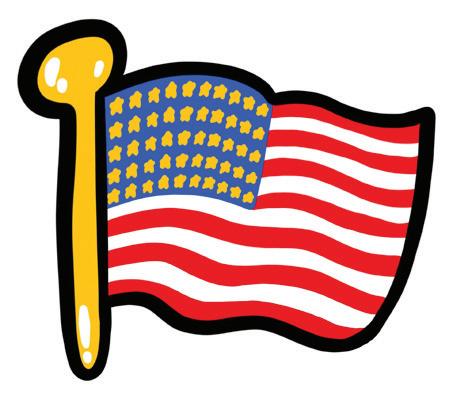
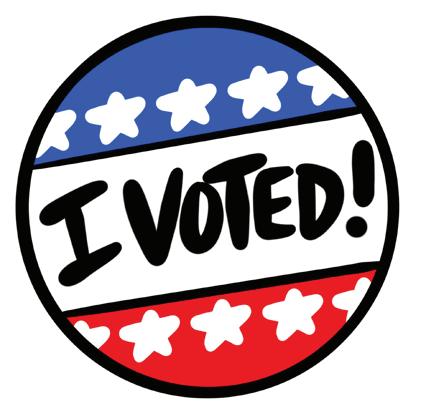
Carter Everly, a Mission for Arizona volunteer and former UA student, has volunteered for Mission for Arizona since the beginning of the fall semester. When Everly saw the group tabling on campus last semester, he said he knew he wanted to volunteer this fall. He has always wanted to be more involved with politics.
“I thought I could make a di erence instead of just using my one vote and make a bigger impact,” he said.

In his eyes, being a canvasser is work that matters, and can end
up making a di erence.
Everly and other volunteers go through a one-day training from Mission for Arizona leaders to learn how to give a pitch. When being stopped by a canvasser, they will ask if they are registered to vote. Depending on the response, the canvasser gives a di erent pitch.
Some students who are at the UA from out-of-state do not know that they do not need to be an Arizona resident to vote in the state. But as long as one has an Arizona address, they can vote.
In the beginning of the semester when more students were getting registered to vote, Mission for Arizona stationed students in speci c places around the university such as in front of the libraries or the Richard A. Harvill Building. Everly said if they were not stationed, volunteers would walk around the campus to collect voter registrations.
Arizona is a purple state,
also known as a swing state, meaning that the two major political parties, Republican and Democrat, have almost equal support amongst voters in Arizona. Mission for Arizona is in support of the Democratic party, and Everly said their goal now is to get voters to know more about Mark Kelly and Katie Hobbs in hopes that Arizona will become a blue state in this midterm election.
“Your vote is going to matter more here,” Everly will tell students when he is canvassing, “because of Arizona being a swing state.”
Everly said he expects Mission for Arizona canvasser volunteers will be back on campus for other upcoming elections, such as the presidential one. As for now, the last day to register to vote for the midterms was Oct. 11. Everly plans to work for Mission for Arizona until November to keep informing voters on Kelly and Hobbs.
MISSION FOR ARIZONA TABLED on the University of Arizona Mall on Monday, Oct. 10, to get students signed up to vote before Arizona’s registration ended.
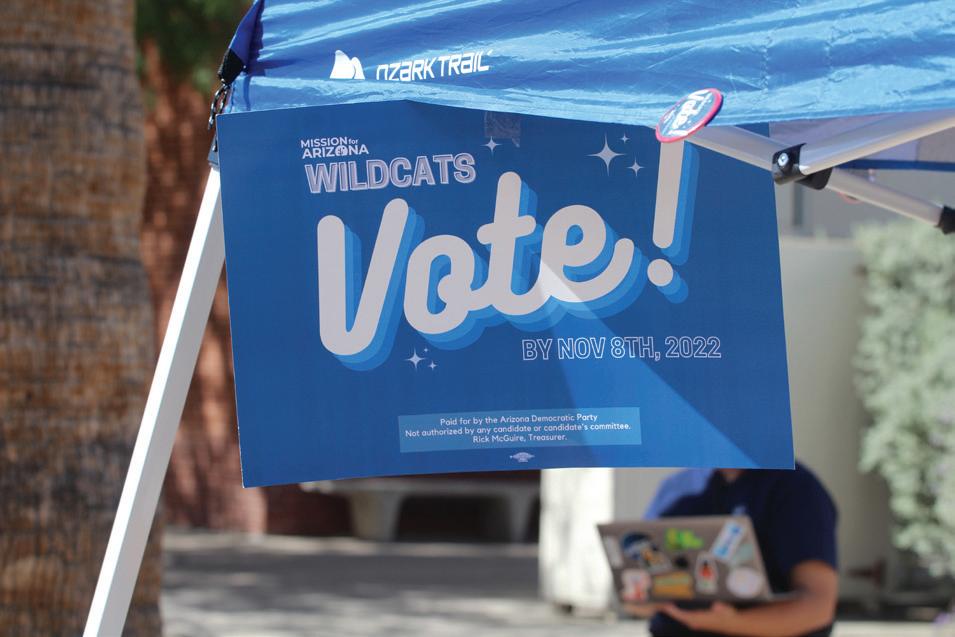
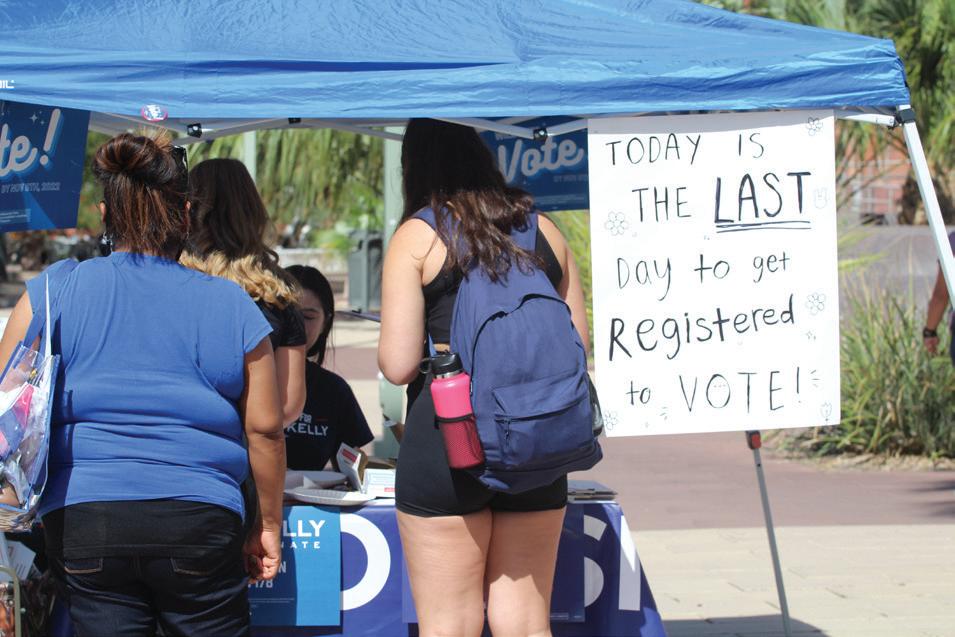
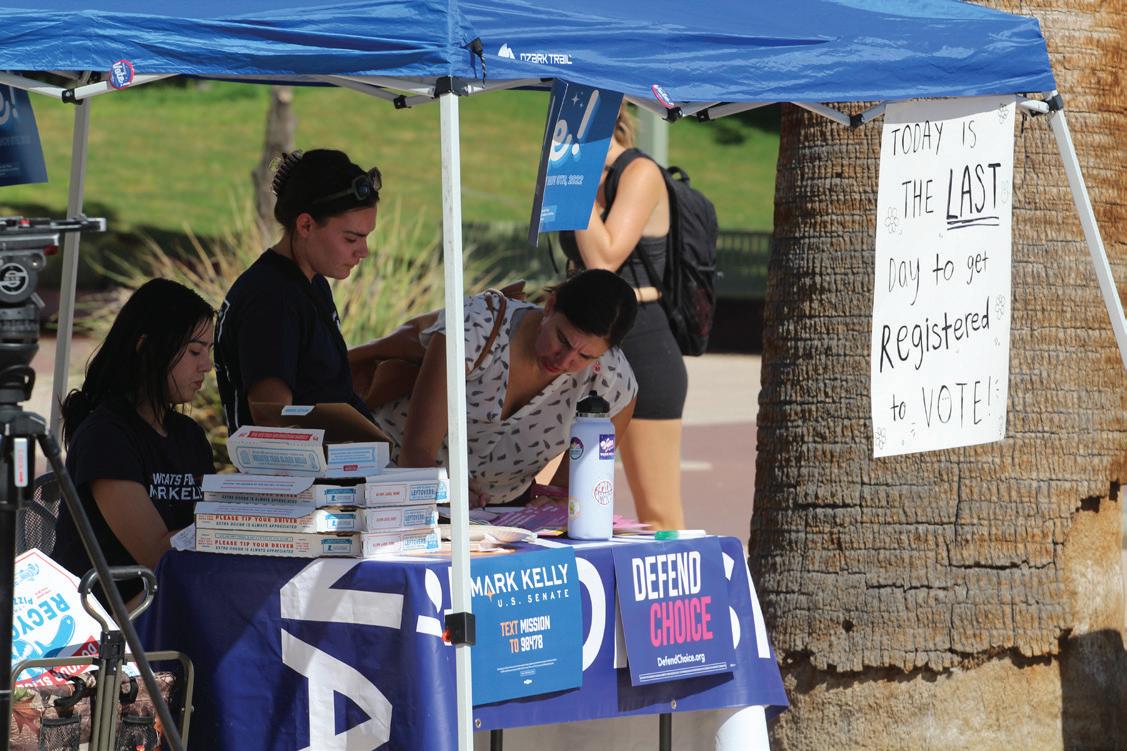
PEOPLE LINE UP TO register to vote with Mission for Arizona on the University of Arizona Mall on Monday, Oct. 10. The group supports the Democratic party and U.S. Sen. Mark Kelly.
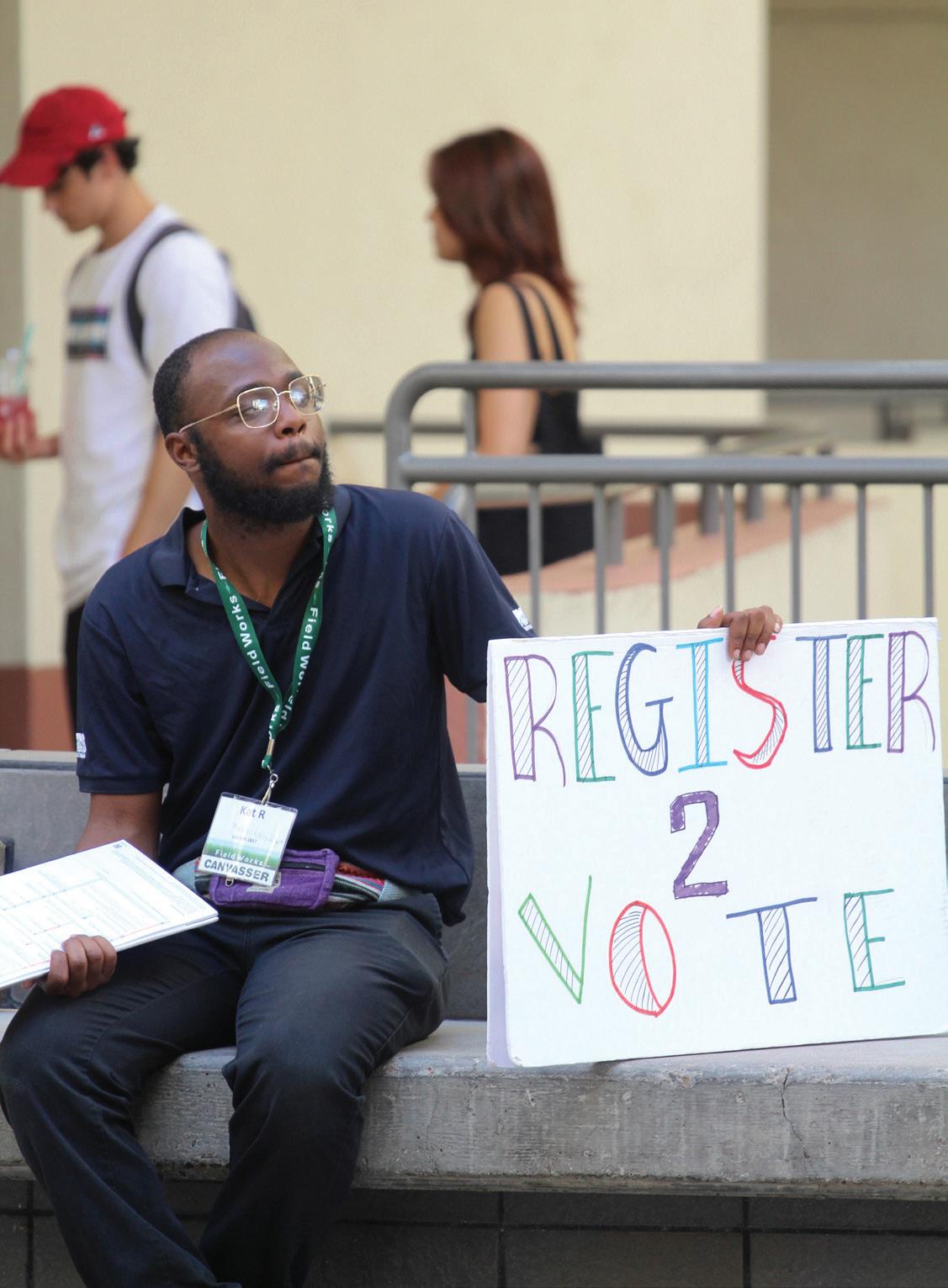
OPINION: Out-of-state students should vote in their home state
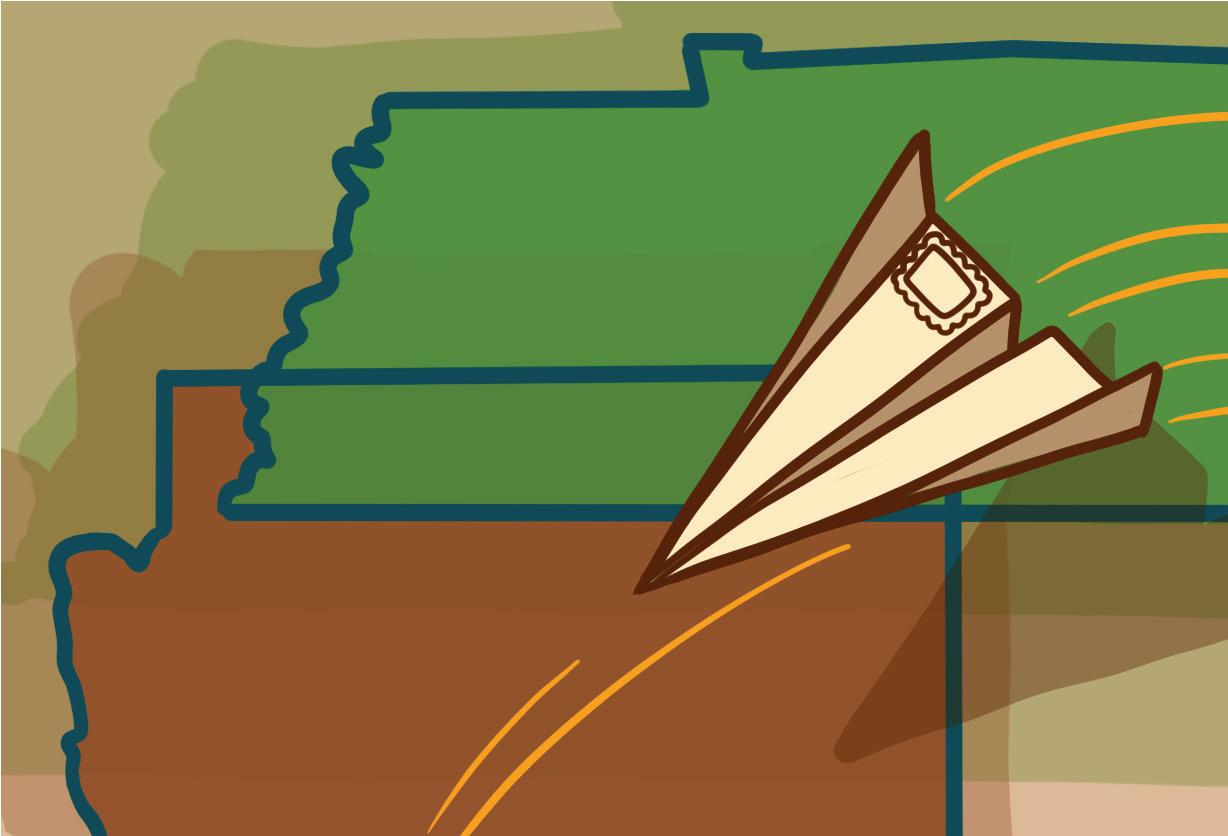 BY LUKE LAWSON @DailyWildcat
BY LUKE LAWSON @DailyWildcat
As college students, we have the opportunity to participate in the electoral process and help steer the direction of politics.
Younger generations have a unique opportunity to understand the political process due to outlets like social media, which about one in ve Americans use to access their political news, according to a 2020 Pew Research Center study.

Due to this level of access to political resources, young people have an extraordinary opportunity to learn about the political process and participate in elections. e o cials we do or don’t vote for in this process make decisions that will a ect us.
ey vote on topics like student debt, social rights, funding for higher education and the economy.
Other decisions that politicians make today will also impact what kind of world we enter upon graduation, so casting a vote is our way to express and decide what we want for our lives and futures.
Out-of-state students are in an even more unique position when it comes to elections, as they can decide which address they choose to register to vote under. However, out-of-state students should vote or continue to vote in their home state.
e policies implemented at the local level will have the most impact on out-of-state students, even while they are away at college. Families, friends, the larger community and even the student can experience political tension from local politics, which can impact the student’s college career.
As an out-of-state student from Tennessee, I see the need to continue voting in my home
state while in Arizona. Tennessee is known for its predominantly Republican legislature and conservative values. Since these values don’t align with my own, the only way I can try and make a di erence within my home state and see my own values re ected in the politics there is to vote in Tennessee. It gives me an opportunity to vote people into o ce who will make economic and educational decisions at the federal level that may impact my college career.
Young voters are increasingly becoming a stronger presence in elections. Millennials and Generation Z had a recordbreaking turnout in the 2020 election, foreshadowing great potential sway in elections to
come. Despite these encouraging statistics and opportunities, young adults within these generations had the lowest voter turnout percentage (51.4%) among all other age demographics in the 2020 election.
Most of the low turnout likely stems from lifestyle and voter registration blocks, as many students and young adults struggle to make time to register to vote or make it to the polls, because of the unpredictability and instability of their schedules.
is can be especially true for college students with loaded schedules. e rules about registration deadlines, voter ID requirements and residency requirements, which can be
complicated for out-of-state students, can impact new and young voter turnout as well.
Older voters show up to vote in midterm elections about twice as much as younger voters, according to the Issues in Science and Technology journal published by the National Academies of Sciences, Engineering, and Medicine and Arizona State University.
e gap continues to widen for local elections, proving that younger voters and students need to be more active in politics, particularly within their own local elections. However, this can be especially di cult for someone who is an out-of-state college student. Navigating one’s local and home state

politics while away can seem overwhelming, as well as keeping up with registration deadlines and voting days.
Despite this, there are many ways students can stay active within their home state.
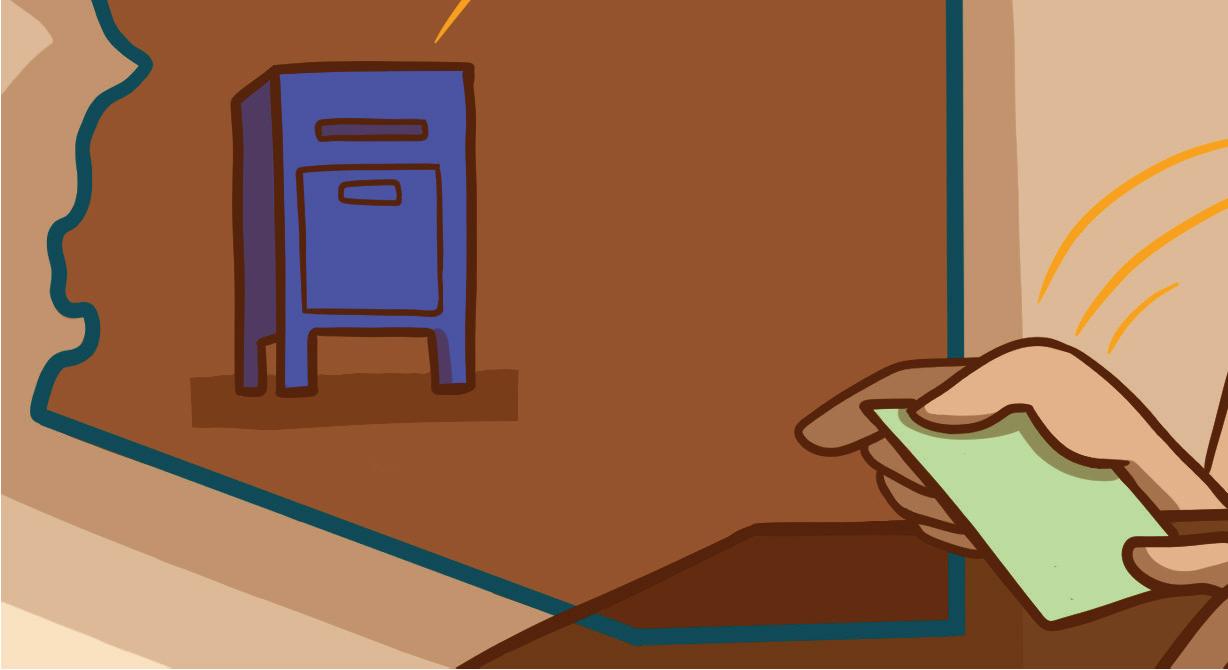
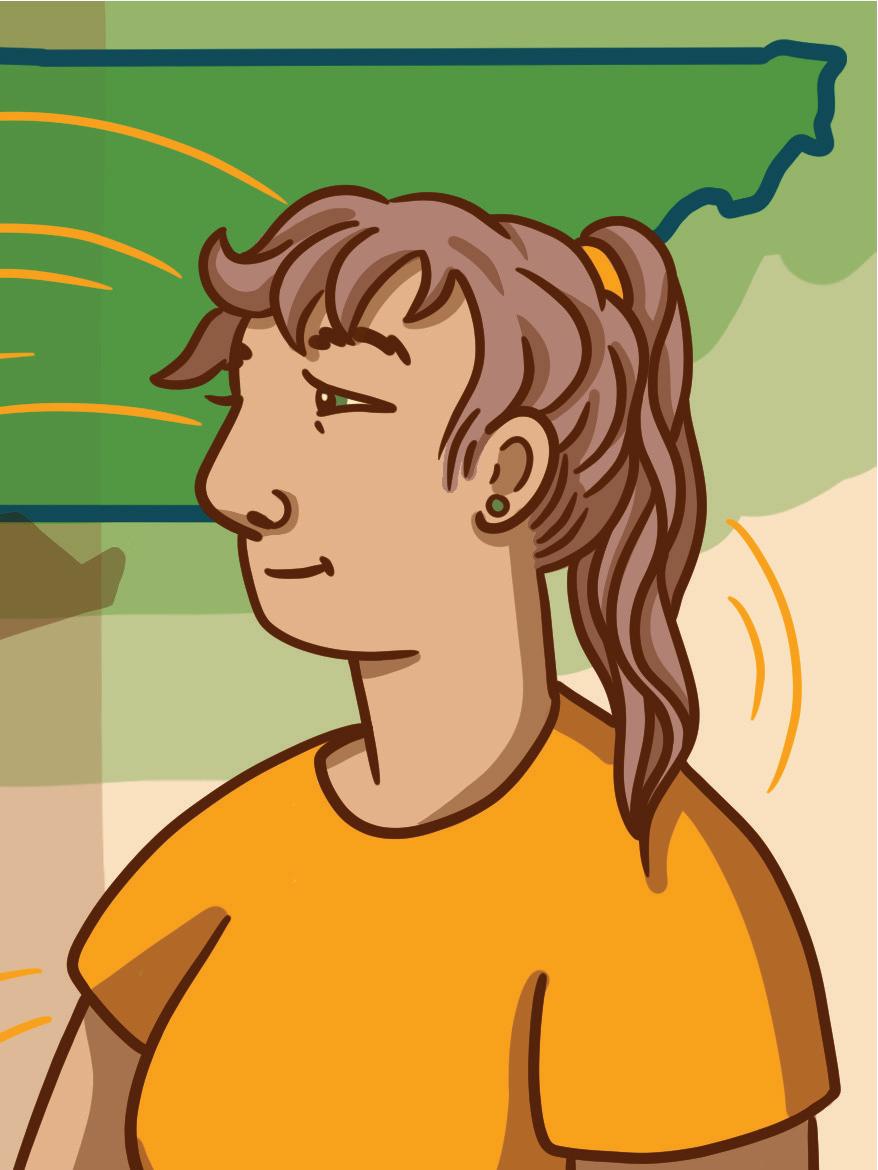
ere are many organizations and resources available for students who want to register to vote. Around campus, many activists attempt to persuade people to register to vote as well.
Out-of-state students can also participate in local elections and midterm elections through absentee ballots. If out-of-state students do not see themselves living in the state they are attending university for the long term, they should continue voting in their home state.
Doing so can not only increase the younger voter turnout rate but can also ensure a student’s voice and values are heard within their permanent state of residence. is is how more diverse opinions and views can be seen in state governments and how youth can begin shaping the society they will enter while in college.
As someone who has felt underrepresented and undervalued because of their views within their own state, and as someone who also had the opportunity to live elsewhere for college where this was not the case, I realize that voting is the only way to possibly change these circumstances for me and others that I care about in Tennessee.
is is why it is essential to vote as a college student and not let residency constraints due to attending a college in a di erent state get in the way of this fundamental right.
— Luke Lawson intends to major in accounting. He enjoys discussing polical events, hiking and watching lms.
COMICS
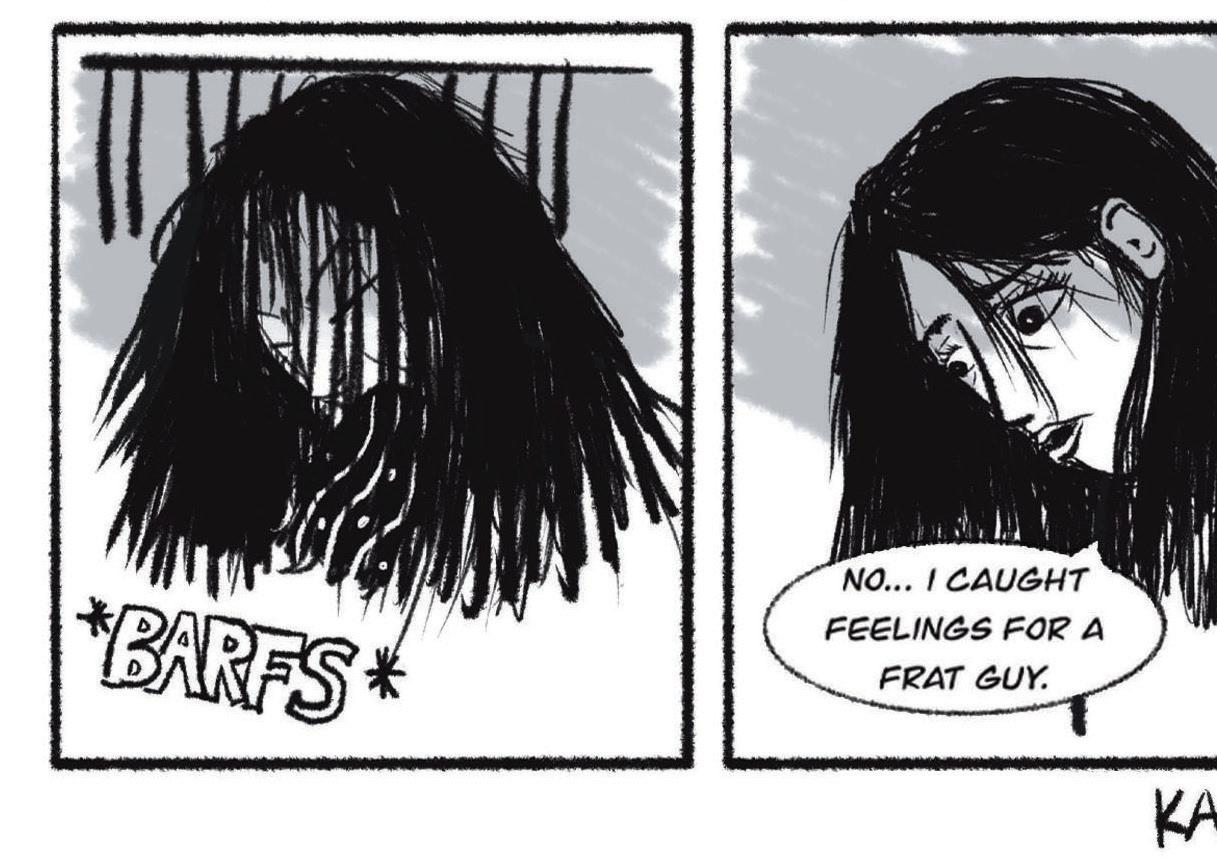
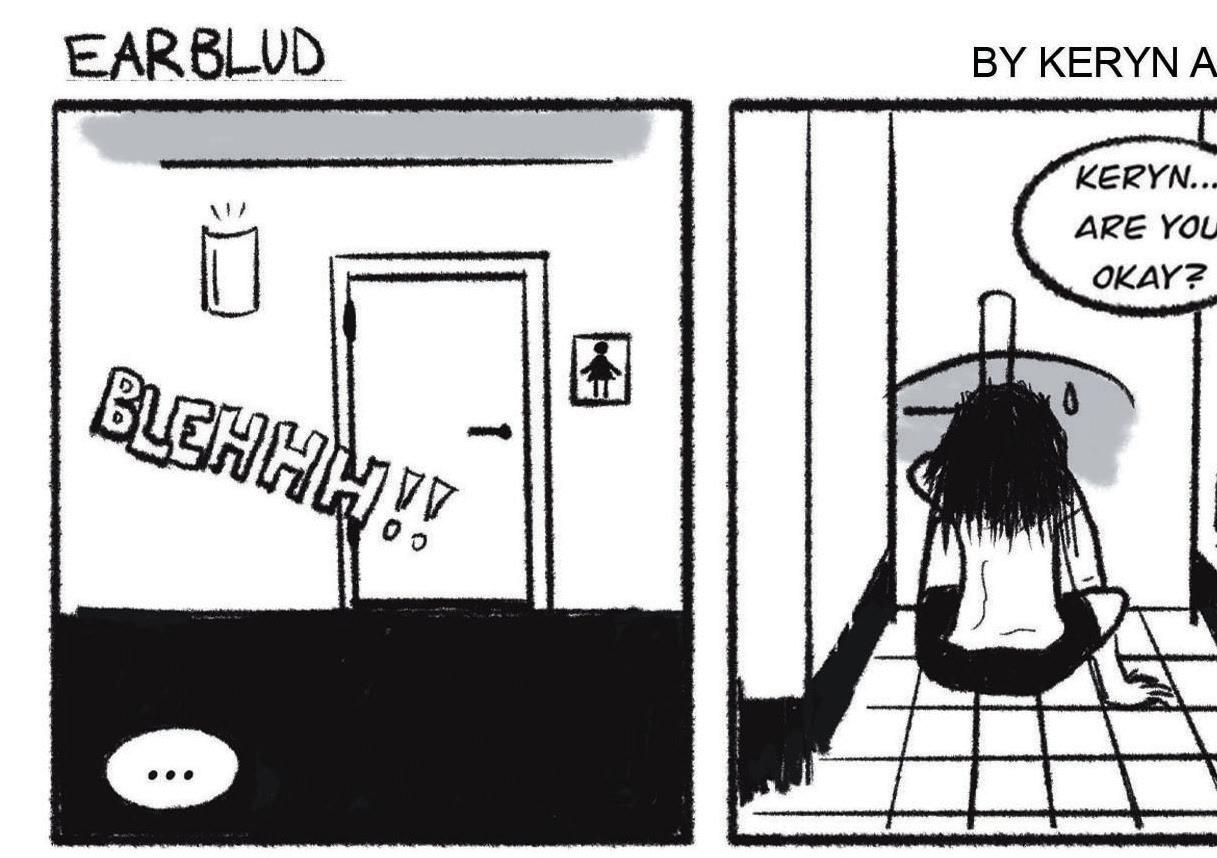
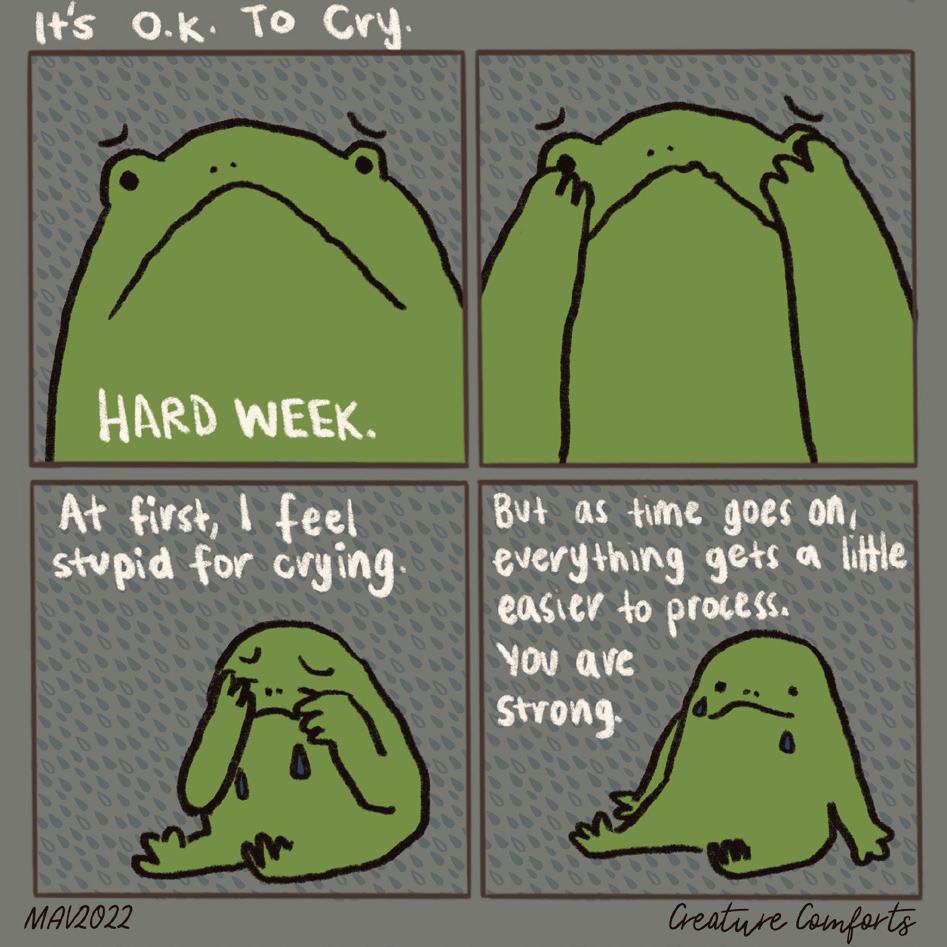
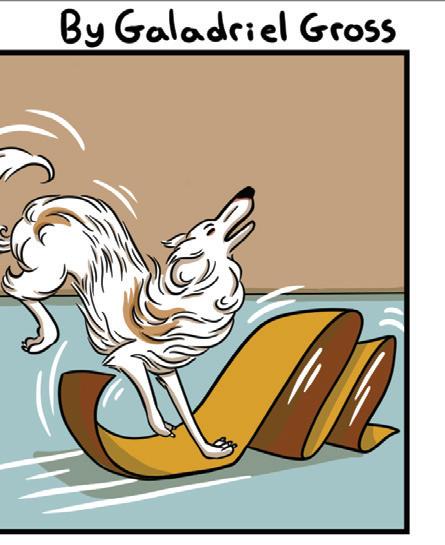
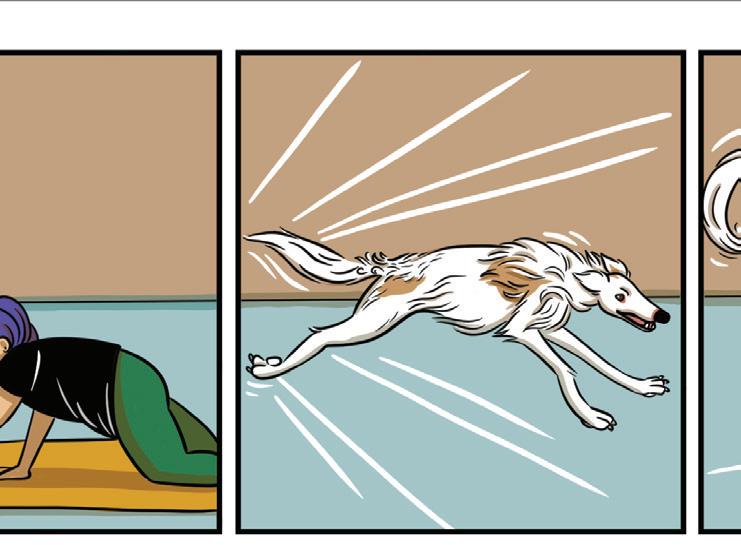
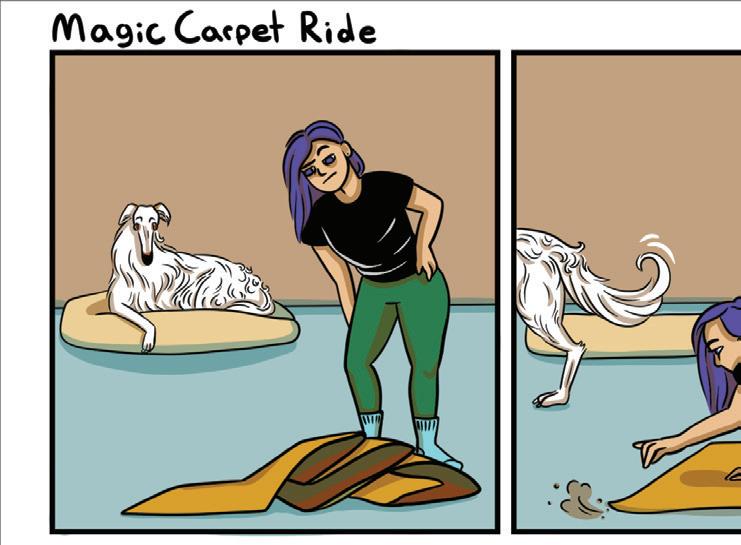



 By Mary Ann Vagnerova
By Mary Ann Vagnerova

